#an attempt at analysis
Explore tagged Tumblr posts
Text
No Longer Human and Humanity
AKA An Analysis Of Sorts, Not Entirely Seriously
I am always rather curious about the in-verse explanations and meanings of the BSD Character's abilities names. Obviously, given I'm rather obsessed with Dazai as of late, No Longer Human has been one of the chief subjects of this rumination. As a fair warning, none of what follows is any attempt to explain or seriously analyse anything in canon - this is more my misguided pursual of an errant train of thought.
No Longer Human is a powerful ability without any doubt. It's an end-all situation - no matter what the adversity, No Longer Human can end it all (except for Lovecraft, but, well). In a world where abilities are the chief weapon, an ability to render them obsolete is devastating.
Asagiri himself said, of Dazai's ability:
The skill to nullify skills is the common type of skill for the strongest characters. It just popped up in my head when I was thinking about No Longer Human as a skill. Something that ruins everything, I thought.
So well, of course it's a powerful ability. But also, it's worse than any "normal" strong ability because it renders it's victim utterly helpless. Robbed of any and all means to use your ability - the chief means of defence or offence - at a single touch.
No Longer Human - the words are inherently derogatory. What does it mean to be No Longer Human? In whatever way you look at it, humans are depicted as superior - be it by their intellect, or by virtue of their empathy, or by evolution, or what have you - being human places one at an elevated rank compared to the animals closest to Homo Sapiens.
Being No Longer Human is a fall from grace - a descent from an elevated status to a lower one.
In the world of ability users, being stripped of your ability is in some way akin to this - belonging to an elevated rank and then being stripped of what made you a part of that rank.
It's what No Longer Human does.
The creators say,
Harukawa: The image of the original Dazai is someone who ruins people around him too, right? Asagiri: He ruined people around him and ruined himself, too. When you read Dazai, you gradually lose your reason to live. It's like everything is sucked away from you. That is why I chose nullification, and anti-battle skill.
The same theme could of course be applied to Dazai himself - but as I am trying to take the contrarian route today, I am overlooking this.
In some way, the need to fight back is an innate trait of humans.
To use a No Longer Human-the-actual-book quote rather out of context,
‘Human beings never submit to human beings.’ Even slaves practice their mean retaliations. Human beings cannot conceive of any means of survival except of a single then-and-there contest.
The point I'm getting to - humans almost need to fight back. To give up is to be defeated. To not fight back is usually cowardice, and cowardice is a base thing. It is lowly. It reduces the status. To fight back - however futilely - is the greater action to do. To be stripped of the very ability to fight back - to be robbed of every possible means to fight back - is a degradation. It is demoting you to a lower rank - No Longer Human.
Because I am currently reading Crime And Punishment, I will also rope an idea explored in it - quite out of context, again - into this.
In Crime And Punishment, Raskolnikov puts forth the idea about humans being divided into two groups of people - the special, and the ordinary. He speaks about how these special people may find it within themselves that the slaughter of the ordinary is quite justified in cases where it is of benefit. This, of course, is a gross simplification of the original idea - but I don't mean to quote it in full.
Applying this to the Bungou Stray Dogs world, and we can elevate the Ability Users to a grander level entirely. They are the Special ones - the Extraordinary - loftier than the ordinary people.
As long as they avoid One Certain Skill, that is.
No Longer Human is a skill that brings people down a notch. From humanity to a lack of it; from elevated status to just normal. At the end of the day, Akutagawa raises his fist and punches in Dazai's face just like a normal, ordinary human - all the abilities in the world couldn't help him.
And there concludes this senseless and aimless ramble. Prudence compels me to wait a day and read it over later, and so you shall be spared the initial version - not that it's any better for the efforts.
(Future me note: I did not do anything more that proofread this, it is as such published in all its raw and well-thought-through glory.)
#bungou stray dogs#bungou stray dogs dazai#bsd dazai#no longer human#bsd no longer human#bsd analysis#of sorts#an attempt at analysis#bsd abilities
26 notes
·
View notes
Text
Hua Cheng wearing wedding colours, Xie Lian wearing funeral colours
Hua Cheng's spiritual weapon being forged in a last desperate attempt to stay alive, Xie Lian's spiritual weapon being forged in a futile attempt to die
Hua Cheng who is dead and has died three times clinging to life with everything he has to the point where he became one of the most powerful ghosts in the world, Xie Lian who is immortal and literally can not die trying to kill himself and being self-sacrificing
Hua Cheng who loves life choosing to die for Xie Lian, Xie Lian who wants to die choosing to live for Hua Cheng (live as in actually enjoy living as opposed to being idle and suffering)
#hualian#hua cheng#xie lian#tgcf spoilers#tgcf#mxtx tgcf#heavens official blessing spoilers#heavens official blessing#y'all will call this meta but it's honestly just a sorry attempt at a literary analysis of the symbolism in this novel
4K notes
·
View notes
Text
I just played through Slay the Princess for the first time, and… I cannot stop thinking about the Cage.
To be profoundly and finally severed from the illusion of your autonomy. To look on, from a prison of your own making, as your body acts out a legacy of violence against the body of the only other person who can or will come near you. To see their body perform that same violent dance. To be bound to this person, and in your limited state not to understand why. In that moment, as the silhouettes in the shadows act out the story of the princess and the slayer, to share a moment of peace with the one sent to kill you.
Intertwined. Diminished. Reductive, mutually destructive. Trapped in an infinite dance.
Beautiful.
To have been so determined you never had free will, never could have found another way. To realize you may have been wrong. To be trapped in a pattern, but unaware of what that pattern truly is.
Still, for that finite and watchful moment, not to be alone.
(Mild gore under cut.)
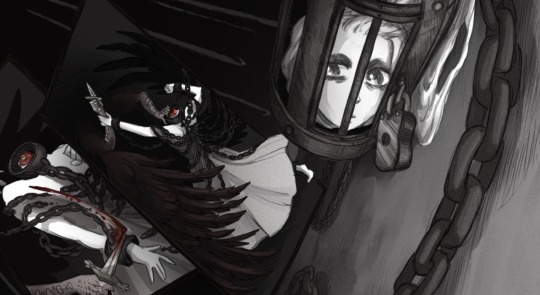
(Also this art from the game haunts me.)
#this was my first route and remains my favorite#what an introduction to the game.#that being said I’ve only done five at this point so grain of salt#this one will remain near and dear though#I can’t wait to meet all the princesses. this is one of the first and only games I’ve been tempted to do a completionist playthrough of#was having fun with the grammar sorry if this is nigh incomprehensible#first time attempting an analysis for this fandom and it’s frankly intimidating. this game is so complex; I adore it and am doing my best.#slay the princess#stp the cage#stp princess#how to tag this#there are so many names and routes and tags to keep track of I am VERY SLOWLY figuring it out#madbard rambles#the fact that this analysis is only the tip of the iceberg of what’s actually happening in this route but I can’t put it into words#so we’re stuck here#gah I love this game
434 notes
·
View notes
Note
Do you think in the N2 Squad, Jamil will just randomly get a burst of confidence and flirt with Leona and Vil, just for them to turn it around on him and he then gets so flustered he enters Caterpillar Mode™️ (pulls his hood over his face) for a solid hour?
I kept this one in my asks for a long time coz, while I thought it was a good ask and wanted to draw something for it, I am also plagued with the terrible curse of being both aromantic and autistic and struggling a lot with the very concept of ~*flirting*~
So first, gonna thank @aria-faye and @the-fab-fox for their insights and having the patience to explain to me the big strokes of flirting.
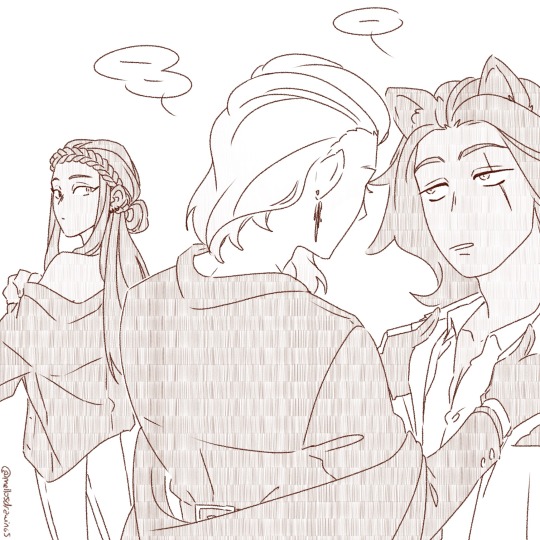
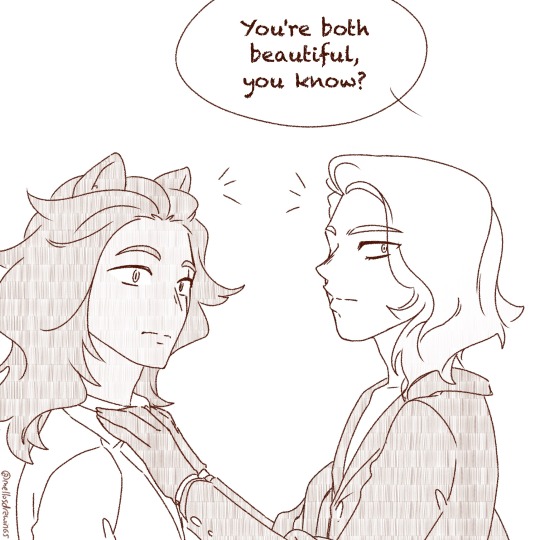
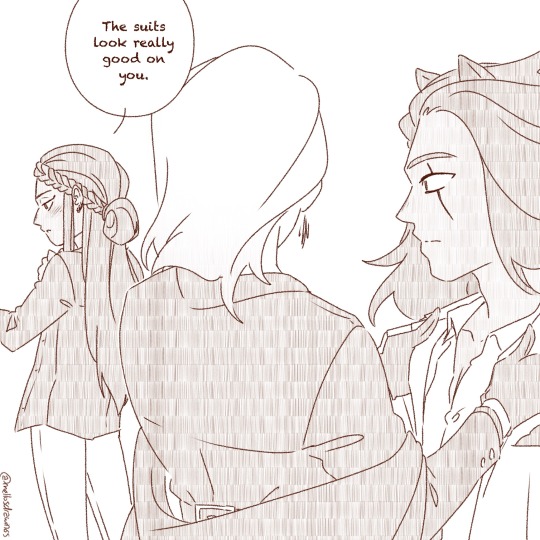
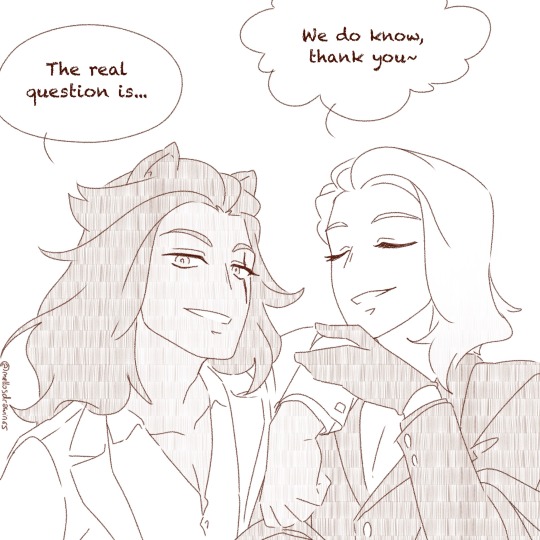
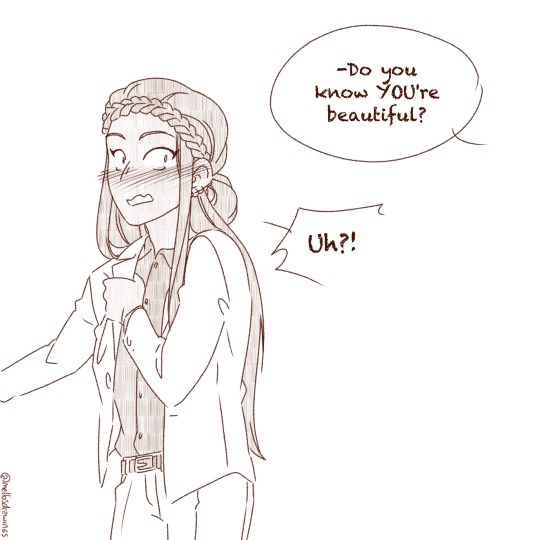
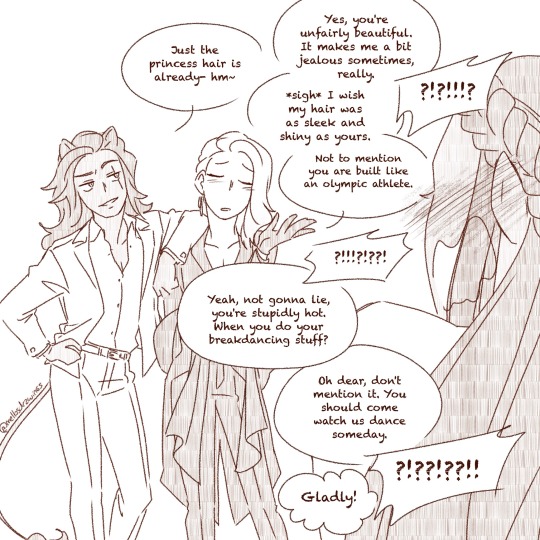
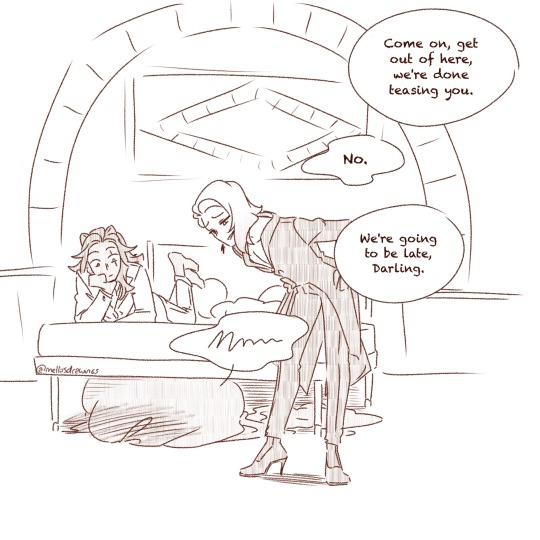
And now, I'm gonna quote aria-faye word for word cause he explained Jamil's flirting perfectly well in my opinion :
"I feel like Jamil is just... bad at flirting. He can tease and joke and all that, but when he's doing it with the intention of flirtation, i feel like he stumbles. His version of intentional flirting would probably be just... being overly straightforward. Saying what he's thinking for once."
"I feel like Jamil isn't very charismatic when it comes to flirting, so he isn't saying it [compliments] in any sort of way. Just pointing out a fact, which, to him, is flirting. Because it's not something he'd normally say aloud."
"Here's the thing: I think if they played the flirting game, and if Jamil said something intentionally over-the-top, teasing flirtatious, they [Leona and Vil] would match his energy and do it right back. BUT Jamil would be equipped to volley that back over and over. It's not flirtation that gets him. There's an element of disingenuous in flirting. It's all exaggerated, a bit untrue. It's an act - a mutually agreed-upon act that everyone in the group enjoys, but an act nonetheless. And Jamil is EXCELLENT at acts. He's no blushing flower when it comes to flirting. He would take that stuff all the way to bed if that's where it led him. But compliments? He has no idea how to take compliments. He has such a low opinion of himself for so long that he never learned. Compliments are what make him blush. Not flirting."
"Like, Leona could be like 'Damn Baby, what does that tongue do?' And Jamil would immediately respond by purring 'Come here and find out.' But Leona being like 'You look beautiful today' would have Jamil like "Oh, um. *blushes, pulls hood over his head* Thanks, I guess.'"
"I think something else that would get him flustered is physical affection. Like he gets all hyped up to shakily hold their hands, and they immediately respond by kissing his cheeks and being sweet to him. That would make him blushy too."
"Flirting is basically just manipulation. Jamil knows how to do that. He's really good at that. It might surprise him at first, but if he's the one initiating, he wouldn't do it unless he knew exactly what he was doing. Flirting for real is kind of fake. A teasing dance you do to get to a more intimate set of behaviors. And Jamil is great at this kind of thing. There are a thousand ways to make him blushy if he's not initiating. But if he's initiating, that implies a level of confidence, so the options for making him blushy circles right back around to honesty."
"Leona and Vil flirt by antagonising each other, so it might take them a second to realize that whenever Jamil drops an Honesty Bomb on them like this and speaks plainly, he's flirting. But once they know, Jamil will never know peace again, because they turn it right back on him and compliment him honestly until he's curled up and hiding in his hood and begging them to stop."
(Yes we had a very long discussion about it x))
#(obviously Jamil's reaction is exaggerated for comedic purposes)#(while he would turn beet red and attempt to hide he wouldn't go that far)#(probably)#anyway uuuuuuuh please don't ask me about their flirting again#i'm terrible at it#there's a reason most of my fics are found family and not romances#mello's drawings#twst#twisted wonderland#n2 squad#jamil viper#leona kingscholar#vil schoenheit#javil#leojami#leovil#ask me anything#analysis#art#my art
737 notes
·
View notes
Text
Where is the line?
In the comics, Tim Drake's moral code is an enigma to me, particularly his stance on the Batclan's no-kill rule. For all the fans who say he's always one step away from full blown villainy, there are even more saying he's a strict goody two-shoes who could never stoop that low.
Then there's the different takes on where Tim draws the line between these two extremes. Personally, I find that line hard to pinpoint. Digging for canon demonstrations of his morals has lead me to more questions than answers. My biggest question right now is:
What counts as breaking the no-kill rule in Tim's eyes?
Luckily, the Robins 2021 comics shed some light on this. In issue #3, "Tim", or rather an imposter of him, said that choosing not to save someone isn't the same as killing them, and that letting a villain die can be a way to get justice. Normally, this point would be moot since it's not Tim himself who said it. However, at the end of issue #6, the real Tim clarified that what the imposter said WAS his real opinion on the matter.
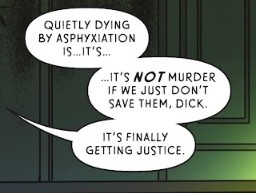
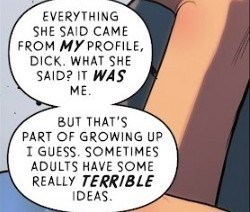
Not only that, but Tim has shown this belief through his thoughts and actions before. Twice.
The first time goes all the way back to Robin 1991 #5. During the fight against King Snake, Tim kicked him through a nearby window, fifty stories above the ground. As King Snake's life hung in the balance, Shiva appeared and commanded Tim to kill him.
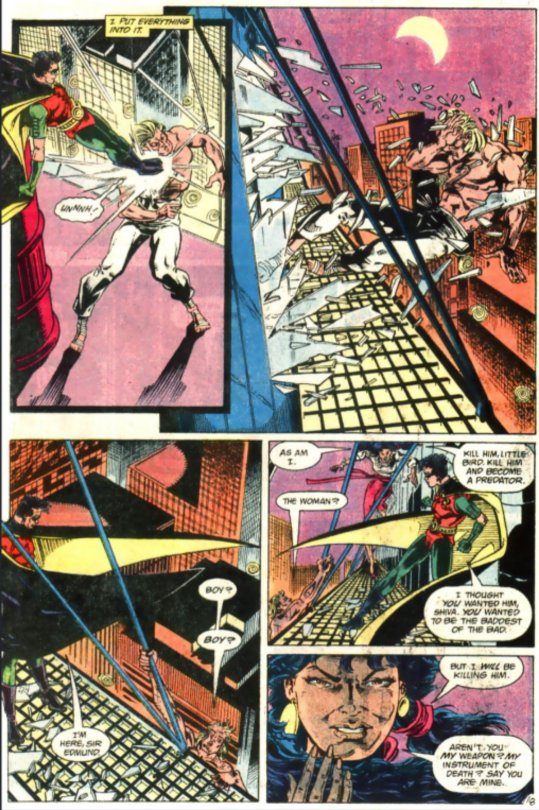
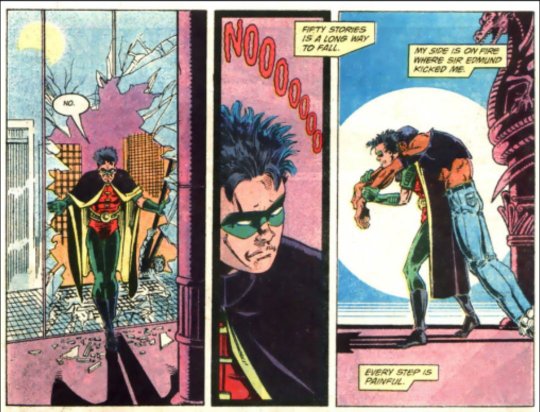
Tim refused. He walked away, leaving King Snake entirely at Shiva's mercy.
What gets me is that Tim made no move to save King Snake from falling. And he made no effort to stop Shiva from committing the murder, either. His only thought as he heard the man's scream was "Fifty stories is a long way to fall."
The second time was in Red Robin 2009 #26. Tim orchestrated a whole plan to manipulate Captain Boomerang into getting killed by Mr. Freeze. The whole time, Tim blamed Captain Boomerang for making all those bad choices, despite Tim being the one raising the chances of them being made. Tim believed he was innocent because he wasn't directly participating.
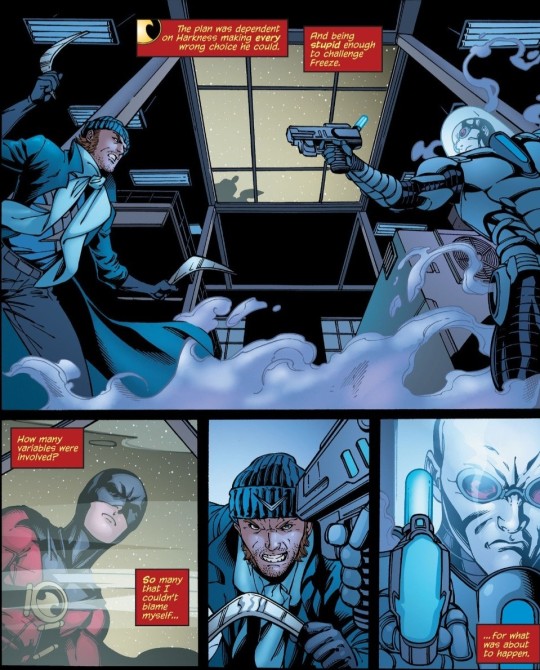
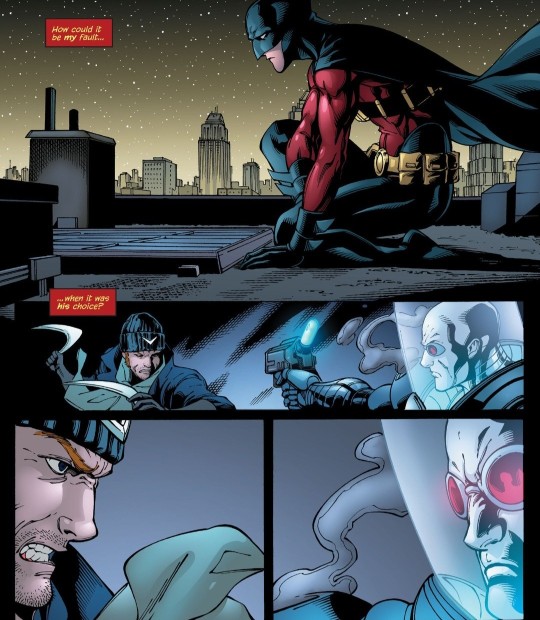
Tim then stopped that plan, but not for any noble reason. He decided that he couldn't let anyone else kill Captain Boomerang but himself.
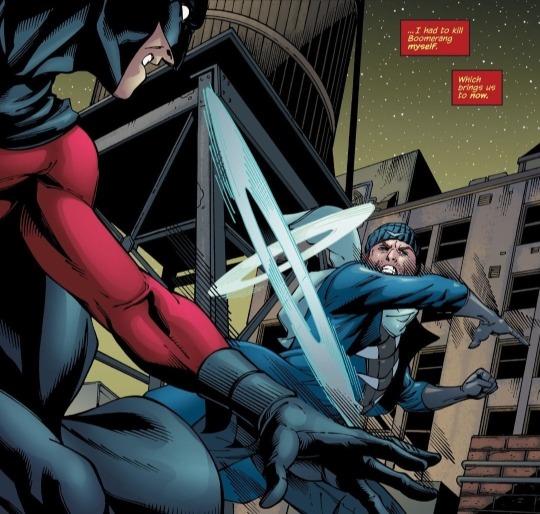
Tim couldn't bring himself to do that, either. So he had to spare his father's killer in the end.
This seems pretty cut and dry so far, right? Tim believing that letting villains die is alright as long he doesn't do the deed himself? I'd think so too, if there weren't other moments contradicting this.
In Robin #35, Steph insisted on leaving an enemy who got buried under the snow to die. Tim chastised her for it.
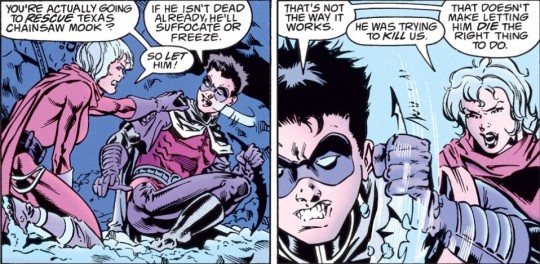
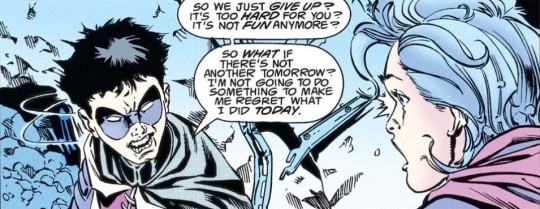
Neither of them were responsible for the snow, or for the enemy getting trapped in it. Plus, that guy tried to kill them with a chainsaw moments prior, so he's not exactly an innocent damsel in distress.
Maybe it was because this enemy wasn't a big enough fish to fry. We didn't really get confirmation that this guy has actually killed before, and he's around goon status at best.
But then in Robin #46, Tim chose to save another enemy who got himself into a deadly situation. That enemy was a murderer known as Young El. This time, Tim wasn't telling anyone else why they should save a murderer's life out loud. These were his private thoughts.
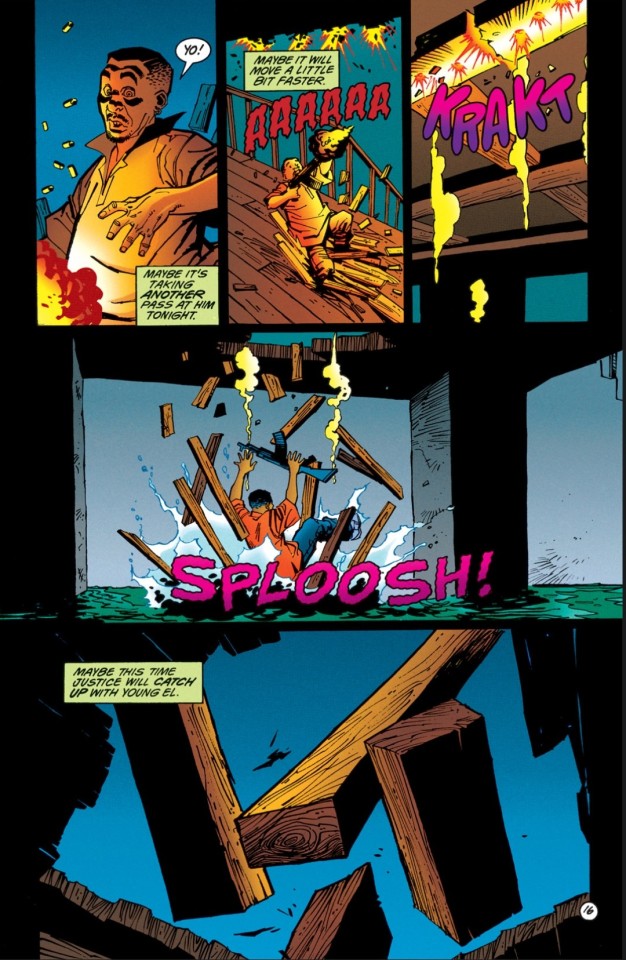
Notice how Tim's inner monologue sounded kind of on-the-fence. He contemplated justice finally catching up with Young El as the floorboards gave way, bringing a support beam down on him in the process.
However, Tim immediately switched gears to rescue Young El from under that beam before the water rose too high.
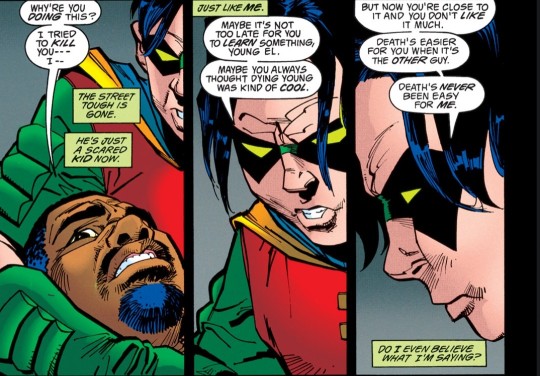
But Tim, as he told Young El the reasons he's saving him, asked himself "Do I even believe what I'm saying?" He could be asking this about two different things he said here. A) "Maybe it's not too late for you to learn something, Young El.", or B) "Death's easier for you when it's the other guy. Death's never been easy for me."
For Tim to doubt his belief in either of these statements is very interesting. He could be questioning if Young El is already too far gone for redemption, or he could be questioning if seeing someone die has never been easy for himself. For all we know, it could be both.
Unfortunately, Tim never got to see if his choice to save him would pay off. Tim wasn't strong enough to lift that beam, and Young El drowned.
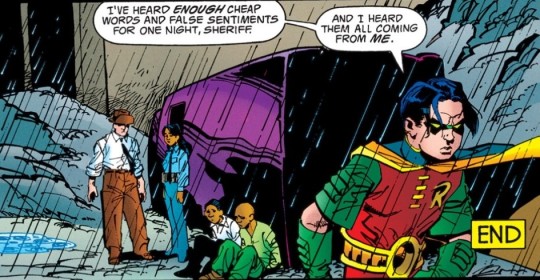
There's a question on my mind as I read these pages. What makes this murderer's death different from when Tim let King Snake fall to his "death"? Sure, King Snake didn't actually die, but Tim didn't know that until later when the man came looking for revenge in Gotham.
Tim was once able to simply walk away from what he was certain would be a killer's demise. But then he's consumed by guilt over not being able to prevent a different killer's death down the line, to the point of hallucinating.

On top of that, what changed Tim's mind later? Red Robin #26 and Robins 2021 #3-6 still happened in the future. The only significant difference I can tell is that these two comics involved the killer's of Tim's parents, making it personal. But if the Imposter from Robins 2021 got his beliefs from his profile before his mother's killer got involved, then does that still hold up?
Maybe we should put a pin on it for now. There are other things Tim's done that brings the details of his no-kill rule into question.
Such as that one time Tim actually killed someone with his bare hands.
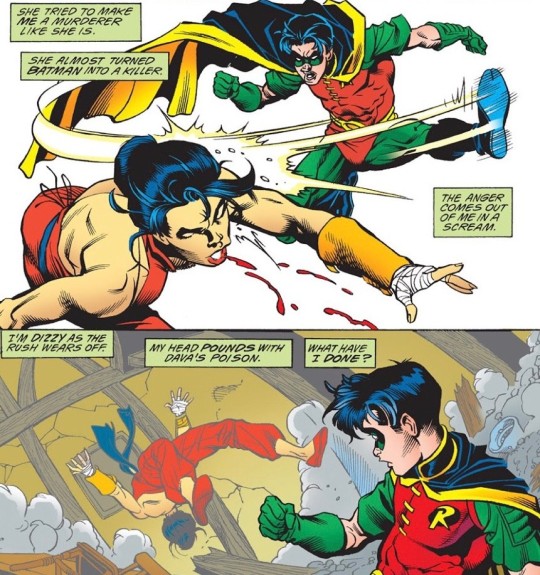
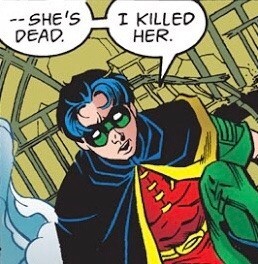
In Robin issues #51-52, Tim accidentally killed Lady Shiva while drugged on amarilla, a plant that enhances the user's speed beyond human limitations.
It may be argued if the amarilla altered Tim's mind enough to excuse him of fault or not. However, I want to focus on what happened after Shiva was revived. Here's another question to go with the first one:
Does Tim believe the kill still counts if the victim was revived afterwards?
From what I've gathered, yes and no. It's kind of complicated.
After Tim killed Shiva, he was understandably distressed about it, about how he can never take it back.
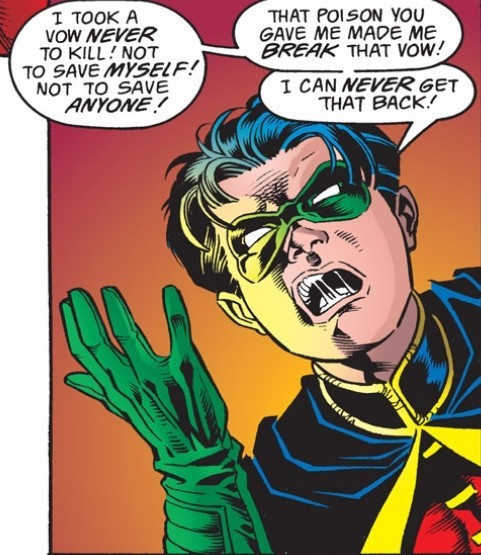
But after Shiva came back to life? Nothing. He didn't dwell on the fact he broke the vow to never kill. For something that devastating to happen in his life, it's odd that Tim didn't bring it up ever again, privately or otherwise. Especially considering what happened later in Robin #123, when Tim thought he killed Johnny Warlock.
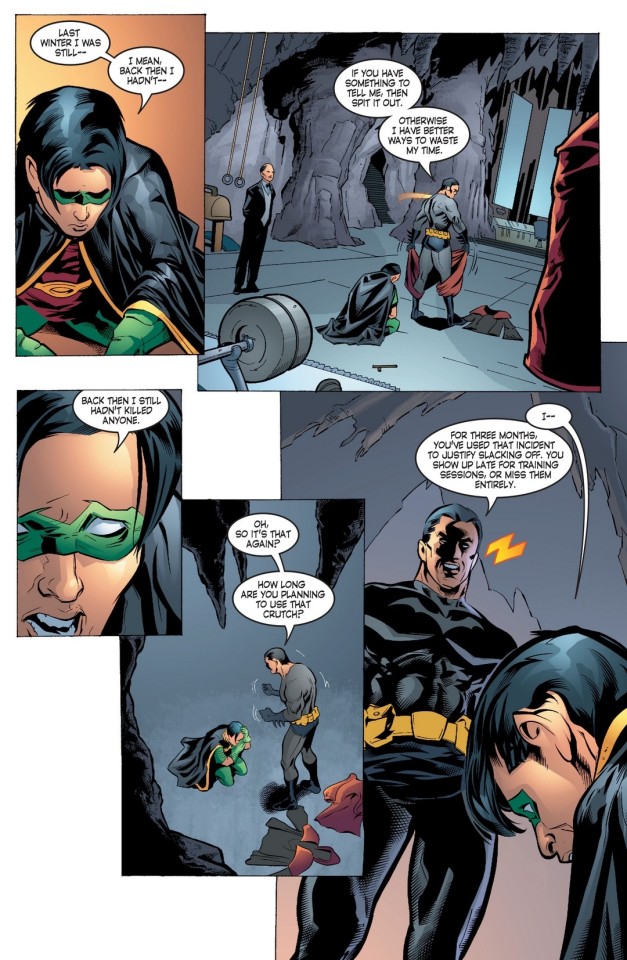
Tim was utterly inconsolable. He lost all faith in his abilities as Robin, and in himself as a whole. It also contributed to his decision to quit being Robin after his dad found out. In general, he seriously dwelled on that "kill" for a much longer time than he had after killing Shiva. The difference being that he knew Shiva was resuscitated immediately afterwards, while Tim didn't know Johnny survived until issue #141.
But there's the fact that Shiva really did die. Her heart and breathing both stopped. So are we to believe Tim moved on from that so easily because she's alive now? What happened to never getting that back?
Come to think of it, not long after Tim killed and revived Shiva, there was someone else who landed in that same boat. Dick.
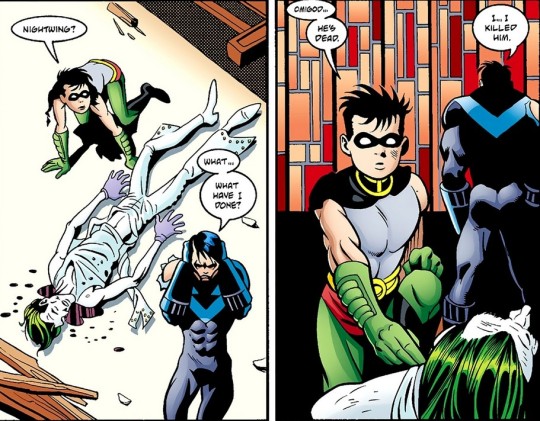
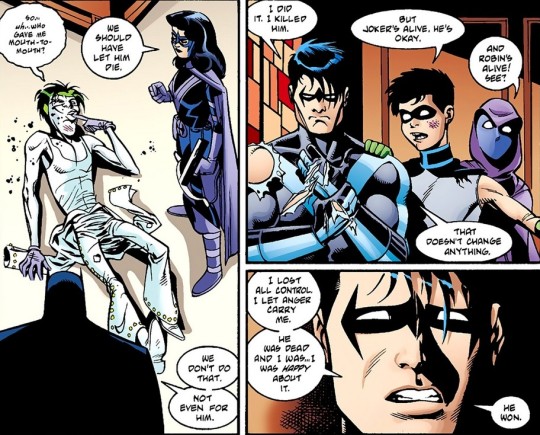
In Joker: The Last Laugh #6, Dick brutally attacked the Joker after believing he killed Tim. Dick ended up accidentally killing Joker instead, before the clown was resuscitated.
Here's the thing. While Tim was trying to comfort Dick, saying that it's ok because Joker's alive now, Dick didn't believe so. He was still distraught that he killed someone. The fact Joker came back to life afterwards didn't matter to him. To Dick, it still counted. So what does that say about Tim?
Before we move on, there's another person Tim knows who also died and came back from the grave. Jason.
Tim openly acknowledged Jason was killed before coming back, too. Multiple times. For example, when they met up in Red Hood and the Outlaws 2011 #8.
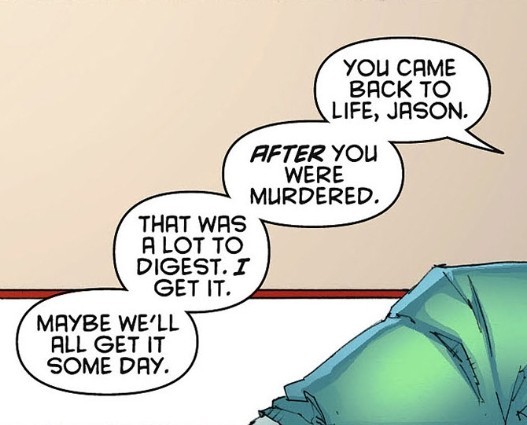
Tim hadn't shown any signs that he thinks Jason's murder doesn't count anywhere, except for maybe once.
In Knight Terrors: Robin #2, Tim and Jason had a heart-to-heart, and Tim said something strange.
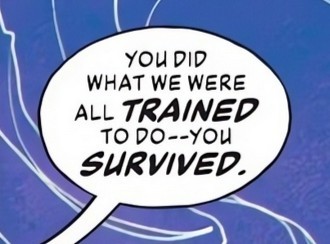
"You survived."
Except Jason didn't survive. He died. To say Jason survived that night would've meant he never died to begin with. Him being alive now doesn't change that. Was this Tim telling a white lie to make Jason feel better? Or does Tim see being revived after death as "surviving"?
Ok, now we can move onto the next question. Or rather, bear with me as we go back to the first question. It's a broad topic with plenty more to talk about.
What does Tim count as breaking the no-kill rule?
We already asked how Tim feels about bringing villains back from the dead after killing them. And we asked how Tim feels about leaving a villain to die without getting directly involved. However, we still don't know how much involvement Tim needs to have in an enemy's death before he'll take responsibility for it.
We can confirm he won't mercy kill in Red Robin #21, even if it means giving someone a fate worse than death. No exceptions.
Tim also doesn't allow anyone he's actively teaming up with to kill, especially if he's the one in command. He's been amicable with known killers before (Huntress and Pru, for example), but only when they remain non-lethal while working alongside him.
Apart from that, though, it becomes less clear. However, I think this is a good place to expand on when Tim blew up a lot of League of Assassins bases in Red Robin #8.
I'm not going into whether or not those explosions actually killed anyone. I've seen evidence supporting both sides of this debate, so I'm just going to say it's up to interpretation. What I AM talking about is whether or not Tim would've felt responsible if they had killed someone.
Before overloading every generator in the LOA database, Tim gave a warning to the Wanderer. He told her that he couldn't be held responsible for what would happen to her if she didn't leave.
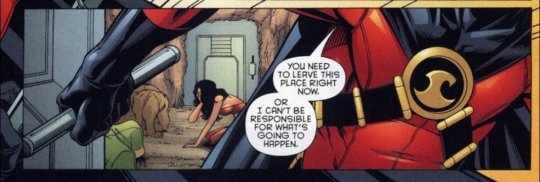
After initiating the explosions, Tim warned the White Ghost that they had fifteen seconds to leave before it was too late.
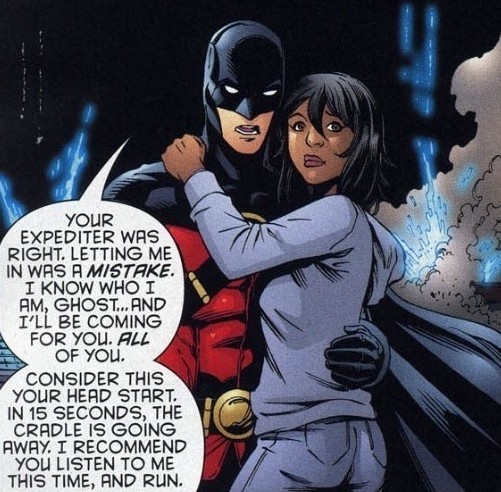
Fifteen seconds. That explanation on the mistake of letting him in might've taken roughly another fifteen to twenty seconds. Did the other bases even get a full minute head start? The way some of the people were already running away could imply they at least got a warning, but it's possible they might not have.
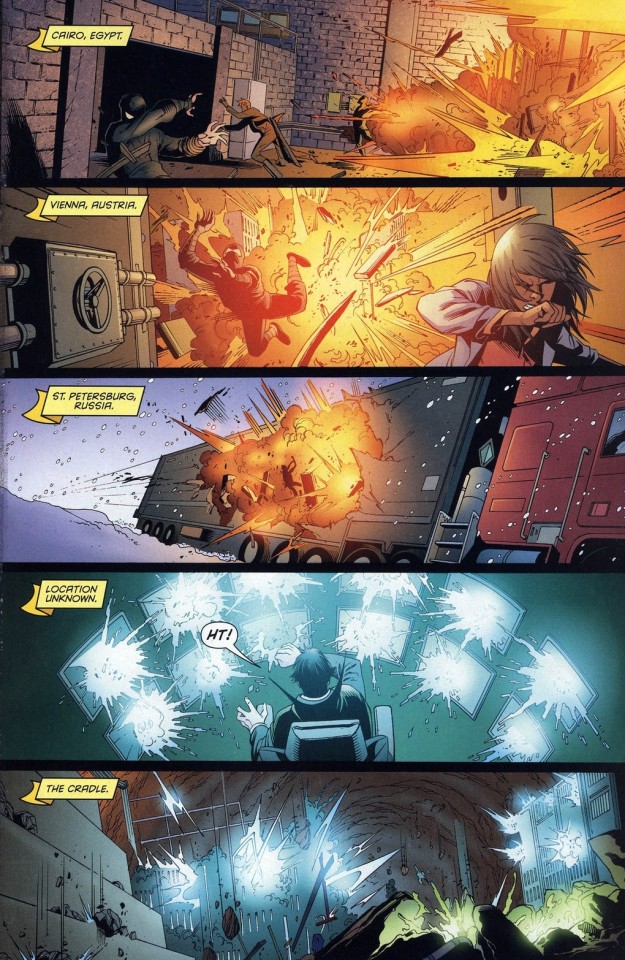
Even if everyone in every base received a warning, would that be enough for Tim to avoid holding himself accountable if they didn't make it out in time? Tim's the one who rigged the bases to explode, but I guess giving someone a warning means it's now their fault for not heeding it?
We can't be sure he even considered the possibility of those explosions killing anyone. Tim knew they were dangerous enough to bring the whole Cradle down, and the other ones we saw looked pretty powerful (except the ones in Ra's hideout). But Tim also called Ra's a murderer right after that happened, which would've been very hypocritical if Tim himself thought he committed murder.
So, my guess is either A) Tim relied on sheer luck for those explosions not causing any casualties and chose to believe they hadn't, or B) Tim didn't believe the deaths of anyone caught in them would be his fault.
Again, this isn't about whether or not blowing up the LOA bases killed anyone. It's about how willing Tim was to take that risk, and if he would've blamed himself for anyone getting killed from it.
Either way, it's canon that Tim had no guilt for the explosions he caused, or for anything he did before Red Robin #22. Just ask the Sword of Sin.
This is an exerpt I got from the Fandom DC Database on the Sword of Sin:
"The Sword of Sin can be ignited with the mind of the wielder, if the person is powerful enough. The sword has the ability to conjure in the mind its victims all of the sins for which they are guilty or have not atoned for."
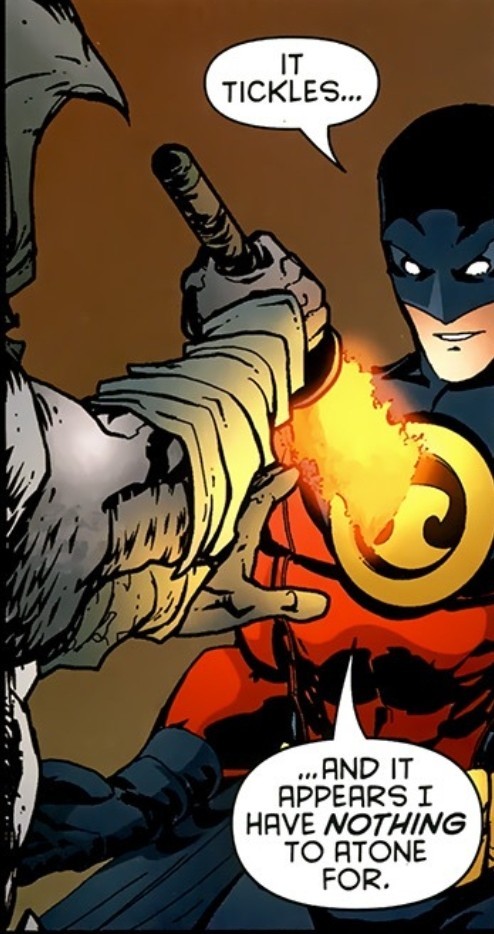
When Tim was stabbed with this sword, he was immune. The Sword of Sin decided he was innocent. Although, I have to ask how reliable this sword was in making that judgement. If the sword is judging others based on its own set principles, then something's not right here.
The Sword of Sin was also used on Dick, and he wasn't immune. It dug into Dicks subconscious and unearthed memories he'd long since repressed. Memories of himself watching a boy get beaten to near death, and then doing nothing. He just walked away.
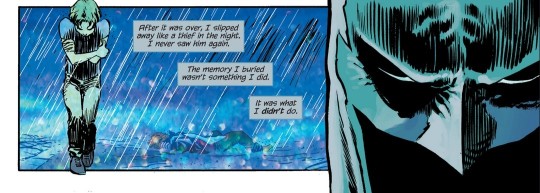
Now, tell me why the sword brought this to light, but not the time Tim left King Snake to die!
It wasn't an accident. Tim deliberately chose to leave instead of trying to save this man from the murderous Lady Shiva. Sure, Tim was no match for Shiva and he might've not been able to stop her, but the same could be said for an eight year old Dick not stopping a group of much older kids. Neither of them tried to stop the attackers.
Tim didn't atone for it, either. When King Snake returned in Batman #469, Bruce told King Snake that it wasn't Tim who left him to die. We know that's a lie, but Tim never corrected this. He let Shiva take all the blame.
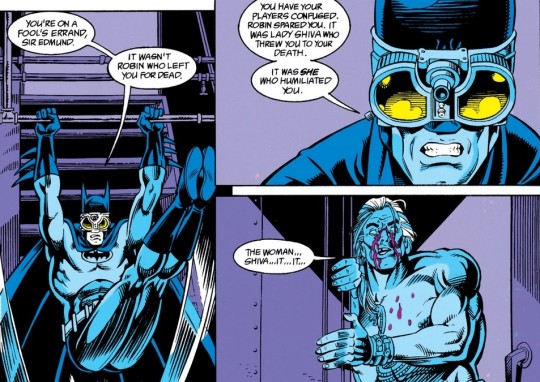
We have two instances of a boy choosing not to prevent someone from having a near death experience. One guilty, and one innocent.
Did the Sword of Sin think Tim was justified because King Snake was corrupt? That doesn't sound holy to me.
Was it because Tim didn't feel any guilt over it, while Dick did? Can the sword's judgement be thrown off by the victim not feeling any shred of guilt over their actions, even subconsciously?
That could make sense given what we know Tim did in the past: King Snake falling, the vandalism (explosions), and ALL the lying over the years (Tim reviving Shiva might count as atonement, so I'm not including that). If the sword based its judgement on God's will alone, then odds are high it would've picked up on one of these.
Even so, I'm not going to sit here and say this is definitely the case. I'm not familiar enough with how the sword effects other characters to make that call.
If this is indeed false, then did the DC universe's version of God decide to pardon Tim of his sins when he prayed earlier that same issue, despite him not believing he had any? I mean, who knows, right?
You can probably see why there's more questions than answers. The point is Tim didn't have any guilt for the things he did before Red Robin #22. Tim was canonically convinced he had nothing to atone for.
So then why did he say the opposite later in Knight Terrors: Robin #2?!
In the heart-to-heart between Tim and Jason, Tim tells him this:
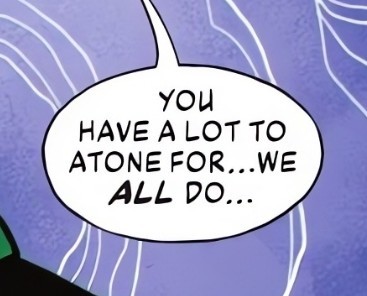
"You have a lot to atone for...We all do..."
Tim knows that the words "we all" include him, right? By saying this, Tim admitted to also having things he needs to atone for, right?
Is this another white lie to make Jason feel better? Is it one of those slight changes the New 52 made to the canon? If not, then why did he change his mind? Did his no-kill rule change and make him feel guilty for some past actions? Is it not the no-kill rule, but something else?
What changed?!
Where does Tim draw the line?
I don't know. We've narrowed it down to a general area, but it's kinda hard to see a line when it's so blurred it could be a gradient.
Tim baffles me. He acts as a steady moral compass for others when he can't even seem to stay consistent with his own. You're free to call it poor writing (and honestly, fair), but I find his hypocrisy fascinating.
That's what it is, isn't it? Tim's a hypocrite who's completely oblivious to being one. And it's not like this was never mentioned in the comics before. Damian called him out on it!
In Batman & Robin 2011 #10, Damian confronted Tim about his near-murderous reaction when Fist Point killed Artemis (Teen Titans Vol 4 annual #1). Damian then accused Tim of constantly rejecting him because they have more in common than Tim's willing to admit.
It's debatable how accurate that accusation was, but Tim had a pretty volatile reaction to it.
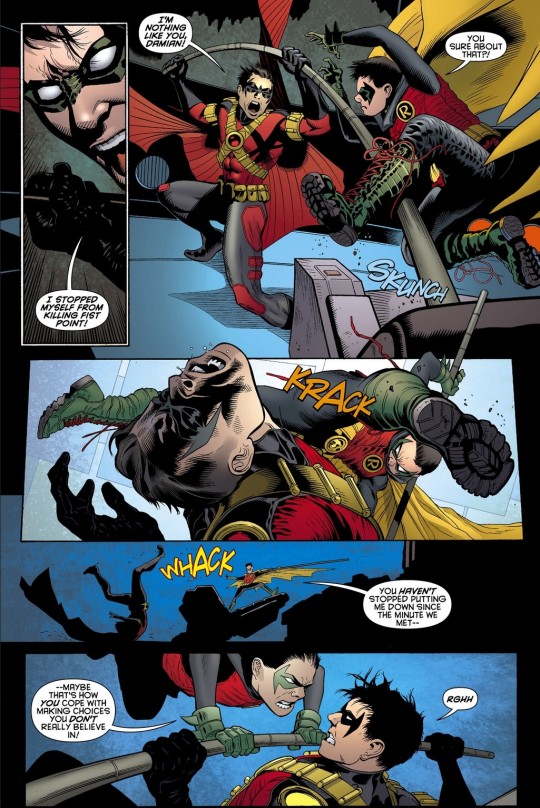
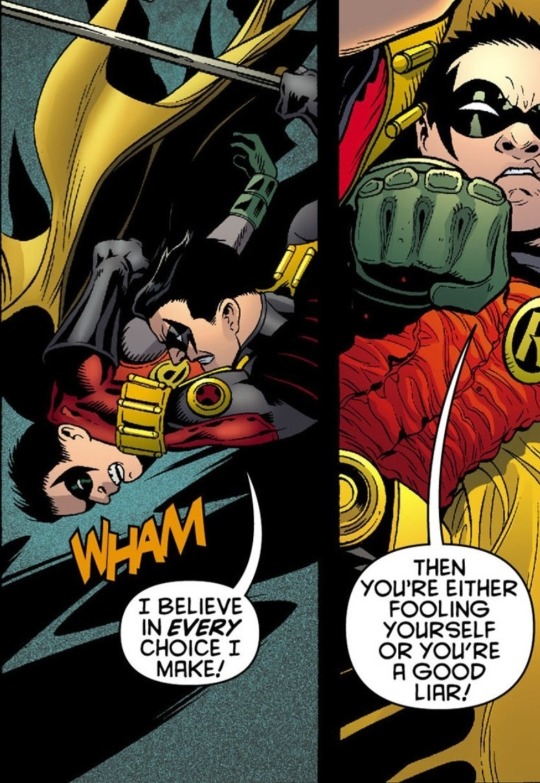
"I believe in every choice I make!"
Does he? I don't think someone who's so sure of what he believes in would contradict himself to this extent. Especially if he wasn't doing it on purpose.
He wouldn't vehemently push Bruce's no-kill rule onto others and berate them for bending that rule, only to go and bend that same rule himself when the Batclan isn't around. He also wouldn't exploit what he thinks are loopholes, decide later that those loopholes broke the no-kill rule, and then earnestly claim he never broke it.
Why is he like this?! He's had arguably the most normal childhood out of the whole Batclan before becoming Robin! What could've made him so fickle about this?!
Where does he draw the line? And how will he know when he's crossed it?
#batman#dc#robin#tim drake#red robin#theory#analysis#long post#tim drake is a menace#unhinged tim drake#To think all of this was written without mentioning Tim's corrupt future selves#or the numerous times he's actually contemplated or attempted murder#Believe me I would've loved to add 5-10 more screenshots of those moments alone#but I hit the 30 image limit :(#Anyway I want to study Tim in a lab#Feedback is welcome#I'm aware I hadn't read all the DC comics so I could've missed something
671 notes
·
View notes
Text
uhhh so the number four is associated with death in certain cultures, including japanese, which is fitting for the butcher’s son, yes but just remember neil was supposed to be number three and jean was supposed to be number four ,and in every draft but one jean dies. he is symbolically saved from that fate by dodging the number four (being given, instead, the number three which represents REBIRTH of all things - i made a whole post about that if ur curious) because it means he was never marked for death. so in this draft, where he’s number three, but was supposed to be number four, he comes so close to death - to the point where renee doesn’t know how he’s still alive - because he was supposed to die, doomed by the narrative, but that number three saves him. that number three represents resurrection, and so he doesn’t die like he was supposed to. because he’s not number four, he’s number three. he comes back. he transforms, he heals. he becomes number 29 (i will eventually make a post about jean and the 29)
neil, though, was marked for death. he had the number four tattooed on him, and he goes through his own narrative believing he will die by the end of it. his survival, however, is foreshadowed in the very moment neil thinks he’s about to die - when he is kidnapped. lola burns the number four - the signifier of death - off his face, leaving him scarred, yes, but not marked for death anymore. and so he lives. and guess what: the number 10 represents the start of a new chapter, that one cycle is coming to an end and a new life is starting, one that you’ve worked hard for. so for the number four to be burned off of neil, that tells us neil is going to live. and when neil becomes neil legally, he settles into the number 10 properly. and his new life begins.
#god this was difficult to write bc i have so much more to say about this but i just can’t word it#like i can’t make myself make sense#so i’ll leave it here lol#aftg number analysis#number 4#number 10#neil josten#jean moreau#aftg#all for the game#the number 10 also represents completeness which is seen as neil completes the team allowing them to get to championships#and the number four also represents balance which neil attempts to achieve on the team#by uniting the upper class men and the monsters#i still have so much more to say but i’ll leave it here#stay tuned for more unhinged number analysis#i have to say when i first read the books at 16 i got SO HAPPY when lola burned the four off neil bc HE NO LONGER IS MARKED BY DEATH SO#HE’s GOING TO SURVIVE THIS#but i’ve not seen anyone else point it out
988 notes
·
View notes
Text
TW: Talk about mental health and sui ideation and sui attempt
I feel the need to talk more about Jayce's "attempt" again because of what I learned from his journal in the "Council Archives"

There's a fair argument to be made that Jayce was already in a very bad headspace even BEFORE the explosion in his apartment.
If you read Jayce's journals it feels like Jayce was ALREADY spiraling before he got kicked out of the academy. For a few reasons.
-----
1.Jayce was very isolated to begin with.
He was working on experiments he knew were illegal and was so paranoid about being found out he started coming up with insults to call another student who almost caught him throwing away a failed experiment.
He also seemed to only be able to cheer himself up by talking shit about other people's work and how everyone else just couldn't measure up to how important his work was and would be. And when he finally meets Viktor he talks about never really thinking he'd take to working with another scientist.
(Honestly, pre-act 1 Jayce comes off a little more like his LOL counterpart which make me believe Arcane Jayce meeting and working with Viktor as early as he did is what helped make him the version of himself he is in Arcane?)
------
2. Jayce was not really sleeping and his schoolwork and grades were going downhill.
He talks in his journal about the fact that he's not getting to sleep until sunrise a lot of nights because he was trying and failing to make the crystals work.
And as a direct consequence of not sleeping he talks about Heimerdinger (the DEAN) having to come talk to him because his grades are slipping.
Jayce literally decides to make a graph correlating his lack of sleep to his poor academic performance.
(Later he expresses concern that he might get expelled from the academy because his work is slipping that badly).
And remember all the while when he is so sleep-deprived he can't focus on coursework he is FULLY CONVINCED he can figure out Hextech. You know a whole new field of study. It doesn't work, shockingly.
------
3. Ximena was already worried about Jayce wellbeing and trying to get him to go outside and be around others.

He eats some snacks insults some people's work to himself and then goes back to doing what he was doing.
Not a lot to talk about with this one except it's no wonder she tried to get him to back off magic if she could already tell he wasn't okay especially when we consider the state he was in at that point.
You also see that both his mother and Heimerdinger were expressing valid concern for him only for him to brush it off.
-----
4. Near the end of the journal entries before we get to the ACT 1 content he says some concerning things considering his later attempt on his life.
First he starts to doubt that he's getting anywhere then he remembers something Heimdinger once said about most inventors failing a 1000 times before succeeding and he makes a self-deprecating joke about "I suppose I must be closing in...".
Then he straight up says he can't see a path forward.
And he then makes a pros and cons list of his experiments where he talks about how the work with the crystals is very dangerous and if he pushes to much it could kill him but also how he's in danger of getting expelled if he can't sort out his schoolwork.
and then he writes.
"Which is worse? Killed or expelled?"
Which is certainly a Harry Potter reference but also given his eventual attempt is very telling.
And it's closely followed by him saying his mom was worried about him, which... seems valid.
----------------------------------------------------------------------
Also on a side note unrelated to the journal entries.
Jayce's attempt was not a choice made suddenly in a rush of emotion like Viktor's, he planned it.

Jayce not only left what was implied to be a suicide note he took the methodical time to literally WAX SEAL the note with his official house mark. And it took Viktor a long long while of talking to him to get him to back away from the ledge. He was fully committed to committing.
-------------------------------------------------
Final thoughts: I think Jayce was in a place in his mind backed into a corner.
He wasn't able to reach out for help or even trust anyone because of the nature of his work. He wasn't listening to people that were concerned about him. And the way in which Jayce was doing his work was damaging to himself and his life in general. He was spiraling.
He needed someone else there to share the weight of what he was trying to do, to be able to reach out to outside of his own head which was the person Viktor became to him.
Part of me even wonders if Jayce was already in a place where he might have ended up on that ledge without the explosion if he didn't change his ways or have a sudden breakthrough.
#arcane#jayce talis#character analysis#jayce arcane#viktor arcane#thoughts#arcane meta#arcane lol#ximena talis#heimerdinger#tw sui ideation#tw sui attempt#jayce and viktor#jayce x viktor#Jayvik#I joked about the journal entries before but the more I reflected on what I read the more you start to realize Jayce wasn't doing so hot#tw suicidal ideation
339 notes
·
View notes
Text
Theory/Headcannon: Since Daisuke's parents are rich, they ARE going to insist for a recovery mission for the tulpar. So Curly might in fact get rescued.
After Curly gets rescued, judging by his state of being, it's obviously concluded that shit went down on the ship and curly wasn't a perpetrator.
After that he gets physical,mental and speech therapy. He talks about everything that happened, to the press.
That's when workplace abuse, and corporate manipulation starts being taken into consideration. Curly sues pony express and wins a 5 billion€ cheque.
During therapy he meets a doctor who falls in love with him. With his s/o's support, Curly gains confidence, and sort of becomes an activist and philanthropist.
And while a lot of people headcanon curly killing himself due to his own grief, I like to believe he lives on to tell his story and keep everybody else's legacy on that ship alive.
He talks about corporate negligence, mental health abuse, and outright subpar human conditions that they were left to.
Maybe THIS was curly's REDEMPTION after all, him being the catalyst for the starting of workplace misdemeanor being taken seriously This is the life he wanted, this is the life he doesn't wanna run away from all the time.
#i posted this on discord and rat helped with the s/o part a bit#my desperate attempt at trying to find a happy ending for captain curly#just wanna see him happy#mouthwashing#grant curly#curly#mouthwashing curly#curly mouthwashing#mouthwashing wrong organ#wrong organ#Curly#captain curly#mouthwashing headcanons#mouthwashing theory#mouthwashing analysis
255 notes
·
View notes
Text
Double Life is so funny to reflect on
bc at the time it was (given 3L -> LL game mechanics and how each game evolved from the last) clearly intended to help with balancing; assigning random pairs to try to alleviate the skill disparity of his friends. And then we get to see Grian real-time speedrun the 5 Stages of Creator's Grief as he realizes that RNG has somehow striated everyone by skill level
But in retrospect, as a piece of narrative, it is one of the most compelling and enduring seasons to engage with. It resulted in pairs that betrayed deep and fascinating character traits. Without a mechanic literally forcing them together we never would've gotten a season of only pairs; a season where Impulse & Bdubs married via clock, where Cleo & Martyn had so many solo discussions, where Joel & Etho burned together in the end. Their similarities, RNG be damned, were precisely the thing that made the season so fucking good.
#life series#life series meta#double life smp#double life#salem tag#if anyone tries to argue the pairs werent random i will point to jimmy/tango and scott/pearl and go:#grian would NEVER create those duos on purpose. every game change was an attempt to introduce chaos or catchup mechanics#and then every single game managed to screw him over lmao#maybe ill publish my full analysis of how i think each mechanic grew from the results of the last and why. sometime.
234 notes
·
View notes
Text
Kind of going insane about the different choices of bite masks for Will and Hannibal.


Transparent for Will vs. white for Hannibal.
At this point of the show, Will is in prison, but he is also needed at a crime scene because of his special autism powers.
His transparent mask is an interesting choice for that. People think that they have discovered his true nature. That he's a killer, a cannibal. That all along, he has been lying to everyone about who he truly is.
However, a transparent mask allows people to still see him and his facial expressions. Yes, he is being held back, but at the same time, he isn't hidden. It's all out there for anyone who has eyes and doesn't jump to a conclusion because it's the most convenient and easy option.
Those who choose to look, to really see him, can still do so, even when he's muzzled. In fact, Jack Crawford's first order of business at the crime scene is to take Will's mask off.
For Will, his mask doesn't take away from his essence, his character.
Now Hannibal gets a white mask.
Let's ignore the obvious associations of "clean", "sterile", "medical", and "Doctor". Instead, let's focus more on what the mask literally does.
Hannibal is at BSHCI on an insanity plea. At this point, people know who, or rather what he is. A killer. A murderer. A man who quite literally eats people. The metaphorical mask is off.
But at the same time, that is also what he is being reduced to. Hannibal the Cannibal.
This is where the mask comes into play. It hides his face. You can't see his facial expression. It's a shield, but it's a shield in both ways. It protects the world from Hannibal, but it also protects Hannibal from the world.
Even if you wanted to look, you can't. Everyone is locked out.
Everyone except for one person.
The one person in front of whom Hannibal chooses to take off his mask.


Will Graham.
#hannigram#murder husbands#nbc hannibal#will graham#hannibal lecter#will x hannibal#hannibal meta#hannigram meta#hannibal analysis#rambles#my thoughts#parallels#i hope this makes sense#this is my first time attempting to write any sort of analysis
122 notes
·
View notes
Text
DR RATIO ANALYSIS
SPOILERS FOR 2.1 CONTENT!
Now, you might be saying - "Aurae, Oh No! and Are You Satisfied? are much too basic songs to analyze Dr. Ratio to! Just because he's a scholar doesn't mean that he has academic trauma!" WRONG! Before we start, I have been researching psychology for approximately six years and I plan to go into it professionally. HOWEVER, that said, I am NOT a professional (YET. One day I will be. Yay for Aurae!) so understand that everything I come to conclusions about has been analyzed with some personal judgement, personal interpretations, and this is just what I have concluded with the info that I have deconstructed from his brain. If you disagree, that's fine!
I will be pulling from my own experiences with being a "golden" and "gifted" child, as well as the experiences I've had speaking to other people who were those. I will also be pulling from my experiences of researching and seeing how people with superiority complexes work, as well as diving into how those work (from what I've seen, as well as how they conceal a lack of self-esteem).
OKAY, NOW THAT THAT LONG AHH DISCLAIMER IS OVER, ALLOW ME TO WORK MY PSYCH ENJOYER MAGIC! Let's deconstruct Dr. Ratio like a lego toy.
Let's start off with how Dr. Ratio presents himself. When you first meet him, he seems like a haughty, arrogant asshole. He likes to PRESENT himself as a stoic, superior scholar who is purely in it to win it, and I got total "*stares down at your tiny body and laughs at how you lack knowledge*" vibes at the very start, due to how he goes around calling people idiots all the time. However, he DOES lose the idgaf war, and we can very quickly see that he does care for other people, even if in his own, strange way. Dr Ratio presentation: An asshole. The reality?
His entire character is based around the idea of helping the masses. He wishes to spread knowledge through the cosmos and give people who didn't have access to it, access. He's a harsh teacher, and calling people 'idiots' is NOT the way to motivate them, but he's doing his best™.
Actually, no, I'm going to go full psych into this. Okay, so here starts the Dr. Ratio and my FATHER COMPARISONS. My father is a professor and he is often called a harsh grader by his students. However, I've spoken to him multiple times because I was curious - why is he so harsh and diligent with his grading system? The answer is - he wants them to actually learn. When he's grading, he gives them harsh marks because he wants them to know exactly where they messed up, and he's always willing to stay after hours to help students understand where they can't. My father also is an enjoyer of knowledge, and for as long as I've remembered, he has prioritized teaching me how to think critically. He wants me to be able to think for myself - and I think that's what Dr. Ratio wants, too. He wants for his students to be able to fully comprehend and absorb the information that he teaches, and although his methods are harsh, he genuinely wants to help. My father's like this too - he hates students that waste his time or aren't here because their hearts are in it. Dr. Ratio hates people who aren't taking their education seriously because knowledge is important. Knowledge is a tool, and to disregard it completely is lowkey kind of insulting - especially when there are people who weren't privileged enough to actually get it, so this isn't something that you should take for granted. Dr. Ratio despises people who take knowledge for granted.
Also, I disagree with the claims that say that Dr. Ratio hates the genius society. He shows open respect for them in his voice lines. Just check them if you need proof. Also, I'll delve into the idea of Aeons and recognition later.
Now that we’ve established that Dr. Ratio kins my dad, let’s let's tackle the 'stoic' allegations. He is LOSING the idgaf war. Like, really badly. He has a temper of a thousand suns and snaps at people frequently, despite his 'impassive' face, his tone holds a LOT of emotion. He seems to feel very deeply and has a shit ton of empathy for others - why else would he be dedicating his entire career to helping others? Of course, he doesn't express this in 'typical' ways of being openly kind - but it doesn't mean that he doesn't care for other people. In fact, he seems to be pretty good at putting himself in the shoes of others and understanding them - expressed in the 2.1 quest where he tells Aventurine to tell him if he can't hold on any longer. Also, he loses the IDGAF war because he is actively trying to help people who want to learn and trying to spread logic and knowledge across the cosmos to those who didn't have it before. Would a man who didn't GAF do that? No!
Now that we've covered his view on knowledge and the way that he presents himself, let's turn to the way that he SEES himself. Now, this is where we get into the nitty gritty of gifted child trauma & academic trauma as well as crippling expectations. It's literally explicitly said in his character stories that he sees himself as mediocre, and it's canon that he doesn't have a good view of himself. His self-esteem is down in the fucking trenches along with my sanity as I write this analysis. The reality is - being called a genius your whole life doesn't really make you feel better about yourself. I'd know. I was. In fact, it makes you feel fucking worse when you can't live up to an expectation. We all fail in life. It's part of being human. But when you're held to such high standards - idolized for your knowledge and the way that you're 'gifted' - the crash comes really fucking hard. Failure is inevitable, and when people who are held on that pedestal experience it, they take it really bad.
The reality is that nobody - not even geniuses - are perfect, but you grow up believing that you are. Then, when you fail for the first time, it all comes tumbling down. The first time I came home with a bad grade was one of the most humiliating moments of my life. I hadn't studied because I was arrogant and I thought that I was smart enough to pass without putting any extra effort into it - because I was a 'gifted' child, right? I should've been able to do it without studying like the other kids. And that's the thing with gifted children – you grow reliant on that title. You cling onto it for dear life for motivation, as well as self-perception. Little by little, the person you are falls apart as you slave away to the perception other people have of you. I think basically every gifted child that I've ever spoken to is a victim of this – and of course, you can heal from this mindset - but it's a hard one to shake.
Ratio's way of presenting himself as being a 'genius' and 'arrogant' also seems to contradict the way that he calls himself 'mundane' at the same time. However, these are two mindsets that can coexist. One part of you believes that you are a genius and that you are perfect, while the other part is crumbling and calling yourself good-for-nothing every time you make a mistake. It's a tiring cycle to live in. This usually leads to people shutting themselves out and closing themselves off after living like that, pushing back your own feelings in favour of being the perfect child. However, we don't know the exact details of Dr. Ratio's childhood, but we can infer that he was held to a pedestal, and this is a very harmful mindset for a child to have.
His superiority complex comes both from how other people view him, but it's a way to cope with his crippling lack of self-esteem. I'm sorry my guy. Also helping others probably helps him feel like he's worth something and makes him feel better because he bases his entire worth off of what he can do and how he can help others. However, this is just my personal interpretation backed by what I have already deconstructed.
In general, this is an easy way to crush self-esteem. You spend your whole life working to meet the image of what other people think you are. In fact, another reason why Dr. Ratio might be so harsh is because that’s the kind of attitude he holds towards himself when conducting research – he’s as hard on himself as he is to others. You end up hating the idea of failure, instead of seeing it as it should be - a way to improve and grow. Actually, I think this could be a reason that he went out of his way to break that illusion of 'worshipping geniuses' in the Space Station. Maybe some sort of childhood connection? Personal connection? In his endeavour to spread more knowledge and make people think for themselves and not blindly follow geniuses, to wake them up and let them think for themselves - maybe, somewhere, in there, he's helping that little child that was almost dehumanized for his intelligence. TLDR: Conflicting mindsets due to trauma, brain vs heart almost - his knowledge that he is a genius vs the crippling lack of his self worth.
Now that we've established Dr. Ratio's self worth, let's take a look at the impact Aeons had on him. Nous, the Aeon of Knowledge itself. I think in a world where the Gods are real, tangible beings that you can reach out and talk to - it makes sense that someone with high ambition and someone who's been called a genius his whole life would seek the confirmation of Nous. When you're a man of knowledge, and you've spent your whole life working with it, being praised for it – it feels natural to look for a god to look down upon you and bless you, right? The Genius Society – it should house him, because he is a genius as well, right? Imagine this – you have been called a genius your whole life, held to that kind of pedestal for so long, and now you wait for the recognition of the Gods. Because if you truly are a genius – then surely, a higher being will recognize your intelligence, right?
The invitation never comes.
And then, comes the doubt.
What if I'm really not a genius? What if everything I've worked for is a lie? Aeons are beings that are 'absolute'. If the god of Knowledge won't accept you or even cast a glance upon you, does that mean that everything was wrong. Gods see more than humans, after all. Gods know more than humans - and that spiral... I think you can see if. (If you don't let me know. I will ramble about how a failure like that can make you spiral down into a worse mindset).
However, the reason why Ratio was never invited to the Genius Society is simple. It’s because he LOSES THE IDGAF WAR. Now, if we look at all the people we know who are in the Genius Society - we find one thing in common. They’re in it to win it for themselves. They don’t help others using the knowledge that they’ve gotten - they use it to pursue shit for themselves. The people of the Genius Society are inherently self-serving. They WIN the idgaf war. Ratio LOSES. Do we see now?
Ratio’s empathy is the reason why he wasn’t let in. He is too human. Nous is a computer. Herta is detached from people. Ruan Mei is literally looking at life as test subjects. Screwllum is a robot.
OUR DOCTOR MAN LOST THE IDGAF WAR, BECAUSE HE IS HUMAN AND FEELS FOR OTHERS!!!
Also, it’s a plausible theory that Nous’s definition of ‘genius’ is different from the human definition of ‘genius’ – it’s a computer, after all. Who knows what’s going on in that code head of its.
However, we still love you Ratio. Never stop losing the IDGAF war.
TLDR: Nous is a computer. It is also in it to win it. It is also self serving. It gazes upon the hoes who are here to win it for themselves. Ratio is busy serving the masses and cooking knowledge in his frying pan. To it, there is no logical reason to be doing this. Therefore, no reason to invite this guy to the Genius Society.
Ratio’s gifted child trauma says otherwise. He wants in. Why wouldn’t he? He’s been working his whole life as a genius.
Nous is like… nah bro, you care too much. Ratio is like, ‘what the fuck?’ And then the AEON OF KNOWLEDGE GOES FOR THE MILK.
Okay, now, quick shoutout to Ratio wanting to help others. He is just like me fr. SO BASICALLY, RECAP OF EVERYTHING I JUST SAID:
Ratio LOSES the idgaf war because he cares about other people. Spent his whole life as the golden egg, and then turns to the gods for recognition because of the inherent trauma of being a child genius. He goes, "hey bro, can you confirm that I am in fact a genius?" and Nous goes, "no, you are too busy cheffing for the masses." Ratio goes, "what the fuck?" and then we collectively realize his attitude comes from blocking off his feelings (while failing miserably), being salty about not being recognized, being put on a pedestal for his whole life, and his crippling depression *cough* lack of self worth *cough*.
Oh, and the "I will never be enough" thought train probably hits him every single day. He is not enough to be recognized by a God. Gods are superior to humans. Maybe nothing has worth after all. Hey, that's Nihility! Hi IX, let's hear what you have to say.
*muffled ix noises*
I see, I see.
The consensus is: HE'S TRAUMATIZED BY EXPECTATIONS! HE WILL PROBABLY SUFFER FROM BURNT OUT GIFTED CHILD IF HE HAS NOT ALREADY!
Okay, now, before I delve into song lyrics (and I KNOW this has been long, just bear with me) I want to talk a little bit (read: a lot) about his relationship with Aventurine. We all know that he cares about Aventurine in his own way. But I want to pull in another idea that I didn’t cover before:
Ratio’s fucking emotional constipation.
Basically, the reason why he has trouble connecting with others is because he was most likely alienated by others as a symptom of being called a genius and being put on a pedestal. This makes him seem unapproachable to his peers, most likely, and therefore, as a result, doesn’t know how to properly connect with others. This just makes his way of presenting affection and care to others even more challenging – because he just doesn’t know how to do it in a healthy and clear way. Academic trauma causing emotional problems, because he’s probably a little bit out of touch with his own. Processing? No! Research. Also, this is very important for understanding Ratio’s character in my opinion, because he’s just a little guy who doesn’t know how to articulate. Maybe he’s got a touch of the ‘tism. Tism mutuals, do we agree or disagree?
However, in comes Aventurine. Love Aventurine, but they are both emotionally constipated. Aventurine displays his affection in ways that Ratio probably only catches after re-analyzing their time together about five times. He’s also a very closed off individual – but Ratio knows this. A cute thing is that Ratio is patient where he needs to be, even if he’s generally a pretty hot-headed guy, and I’m like… bro… that letter… “I wish you the best of luck”... I will wait for you…. GAY ASS MAN…
Sorry the Aventio demons took over. Anyway, what I’m trying to say here is that they both have nonverbal communication with one another that they clearly decipher and Ratio obviously cares for him (he came back and almost jeopardized the plan just for the sake of his ‘coworker’... okay gayboy…) and they just have such a neat little dynamic… Aventurine lets Dr. Ratio do his thing… understands his emotional alienation to a degree…. they’re so neat….
Okay, Aventurine segment over. NOW, FINALLY, WE CAN GET TO THE SONG LYRICS!!! YAY!!!! We all cheered!!!
We are going to be here for two more amber eras, because I realized I actually want to analyze every single lyric from both of these songs. Brace yourself for like, 2k more words. Help.
I think it’s only proper that we start off with ‘Oh No!’ the song that has haunted me since my childhood.
“Don’t do love, don’t do friends
I’m only after success
Don’t need a relationship
I’ll never soften my grip”
Remember when I mentioned that alienation was a big part of Ratio lore? Yeah, that manifests itself in this. When you spend your entire life chasing after knowledge and being held to that standard of untouchable genius, it makes sense that you couldn’t connect with others and that you turn your gaze only to success. Therefore, relationships that are interpersonal lose meaning for a bit – you’re just looking for answers and ways to help them, not connect with them. Also, this is what he wants to do – so he’s never going to pass down an opportunity to better himself or to help someone else.
“Don’t want cash, don’t want card
Want it fast, want it hard
Don’t need money, don’t need fame
I just want to make a change
I just wanna change, I just wanna change”
This is directly alluding to his reasonings for distributing knowledge across the cosmos. Was he based on this song? Maybe he was. He’s not looking for money or fame, his ultimate goal is actually pretty selfless – to bring knowledge and give people the tools they need to think for themselves. He just wants to make a change – he just wants people to be able to have access to knowledge and help cure ‘stupidity’. He wants to do it as quickly as possible, always reaching for lofty goals that might seem impossible, but he will make them possible.
“I know exactly what I want and who I want to be
I know exactly why I walk and talk like a machine
I’m now becoming my own self-fulfilled prophecy
Oh! Oh no! Oh no! Oh no, oh!”
Ratio knows his goal. He knows what he’s working towards. I do believe that he understands why he is the way that he is – he has a degree in Psychology, after all. He knows how he’s been hurt but at the same time, the trauma brain probably doesn’t want to recognize it and he hasn’t stepped into healing yet. He knows what he went through impacted him, but he’s too busy helping others to help himself. He’s becoming what he wants to be, and yet he’s not, all at the same time – which causes the idea of “oh no!” as a kind of cry for help, almost. He’s too proud to ask for it himself, of course, so he’ll fall alone until someone manages to catch him and give him the strength to continue holding on. Aventurine is that.
“One track mind, one track heart
If I fail, I’ll fall apart
Maybe it is all a test
‘Cause I feel like I’m the worst
So I always act like I’m the best”
Now, these are the exact lyrics that made me associate this song with Ratio in the first place. He’s got a singular goal that he will do nothing to stop at getting, that he goes so far to get to. However, as I mentioned earlier, failure is not an option for those who were deemed gifted or genius. You are perfect, so therefore you must live up to everyone’s every expectation and surpass them, too, in order to keep your perception of yourself intact. Ratio does not hold himself in high regard, but acts arrogant in order to hold himself together and not fall to the self-deprecating thoughts, even if they fall through the cracks. It gets tiring to hold yourself together like that for a long time, you know?
“I’m gonna live, I’m gonna fly
I’m gonna fail, I’m gonna die
I’m gonna live, I’m gonna fly
I’m gonna fail, I’m gonna die”
Remember how I was talking about contradictory mindsets and how they can coexist. This is them. The feeling of crippling self-hatred and lack of self esteem versus the idea that you can do it, you can make a difference – you were born a genius, this is what you’re going to do. This is the knowledge that you are a genius vs the lack of self-esteem that Ratio has. “Mediocre” vs “genius” mindset, eh?
All the other lyrics in this song are repetitions of what I’ve analyzed before, so let’s move onto “Are you Satisfied?”
To be honest, there are only a few lines in this song that allow me to connect it to Ratio, so therefore, I will only be analyzing them. However, if you think that other lyrics can connect to him, I’d be interested in knowing how.
“What you’re gonna be
It’s not my problem if you don’t see what I see
And I do not give a damn if you don’t believe
My problem, it’s my problem that I never am happy
It’s my problem, it’s my problem on how fast I will succeed”
Pretending to not care about how the world sees you is so fucking real. Sometimes, you really don’t give a shit, and sometimes it’s all you can think about. Ratio… doesn’t seem like he’s the happiest person. He works himself hard and he’s always chasing after a goal that must be exhausting. He’s always doing his best, and I think even with his empathy, it’s easy to start not giving a shit after trying for so long and so hard. Accepting help is one of the hardest things that anybody can do, especially with how much pride he has. His personal problems are his personal problems and he can deal with them on his own.
“High achiever, don’t you see?
Baby, nothing comes for free
They say I’m a control freak
Driven by a greed to succeed
Nobody can stop me”
Nothing comes for free. A lot of the things Ratio has achieved is due to his own intelligence, yes, but also because of a shit ton of hard work. His goal is literally to cure the universe of ‘stupidity’ – and that’s a pretty large fucking goal. He is a high achiever who likes to know the details of every situation when he can in order to try and make things better, and he is driven by a greed to succeed. Why wouldn’t he be? Success is important, and success means helping more people. He isn’t going to allow himself to be stopped by anybody – not even anybody from the Genius society.
Okay, and we have finally reached the end of my analysis! This caps at around 4k words, so if you stuck around for this long, thank you so much. I would love to hear any of your comments, and I hope you laughed a little bit. Thank you again! This means so much to me that you read. <3
#dr ratio#drratio#honkai star rail#hsr#hsr dr ratio#hsr ratio#veritas ratio#character analysis#song lyrics#song analysis#attempt at humour#so that you don't get bored#long ahh analysis#analysis#media analysis#aventio#ratiorine#managed to sneak them in#i love homos#help#god help me#aurae analyzes
561 notes
·
View notes
Text
Do you ever just find yourself overcome with a lot of Feelings about a character that fandom often uses as a punching bag?
So anyway, Emmanellain de Fortemps.
I think about him a lot more than I let on around here. Yes he's a bit of a ponce and a dandy and the like, but he has a good heart. He saved Honoroit from indentured servitude. (Although I thought they originally met when he paid Honoroit to carry his bags then took him in from there? Did the lore change?) Either way, he personally taught Honoroit to read and write. He personally taught Honoroit to read and write. I'm not over that. Emmanellain didn't have to go out of his way to invest personal time and resources into teaching Honoroit, but he did. I'm not over that!! I refuse to believe that doing so came from anywhere else but a place of sincere compassion!
And speaking of sincerity, I feel like that's the source of some of his issues. Having grown up in a broken home and being the apology child and clearly having some anxiety issues, I think he struggles to be sincere. He has to be the good second son, and the goofball who diffuses negative situations, and an Ishgardian noble which no doubt comes with its own entire category of repression. All his running away from responsibilities and passing the buck and etc. etc. strikes me as someone with severe anxiety that manifests in avoidance habits which just hits way too close to home for me. But. But! He's learning how to face his anxiety! Don't you remember how inspired he was after the grand melee??!! "We need only show them the way." He wants to help people and guide Ishgard into that bright future he's finally able to glimpse himself!! He's trying to be sincere! He's trying to be true to that good heart of his! His love and curiosity for the world around him is growing, and helping him grow in turn! Emmanellain will probably always be a ponce, but he'll also always be generous and fun-loving and considerate!
EMMANELLAIN DE FORTEMPS

#ffxiv spoilers#heavensward spoilers#ffxiv#emmanellain de fortemps#this isn't an attempt at proper analysis#i just have a lot of feelings right now#there's a good chance i'll make a similar kind of post for magnai too
169 notes
·
View notes
Text
Double Indemnity, Veritas Ratio and Aventurine

This was originally a part of my compilation post as a short analysis on the Double Indemnity references, linking to this great thread by Manya on Twitter. However, I've recently watched the movie and found that the parallels run much deeper than just the mission name and the light cone itself, plus as the short synopsis I've read online. Since there isn't really an in-depth attempt at an analysis on the film in relation to the way Aventurine and Ratio present themselves throughout Penacony, I thought I'd take a stab at doing just that. I will also be bringing up things from Manya's thread as well as another thread that has some extra points.
Disclaimer that I... don't do analyses very often. Or write, in general — I'm someone who likes to illustrate their thoughts (in the artistic sense) more than write. There's just something about these two that makes me want to rip into them so badly, so here we are. If there's anything you'd like to add or correct me on, feel free to let me know in the replies or reblogs, or asks. This ended up being a rather extensive deep dive into the movie and its influences on the pairing, so please keep that in mind when pressing Read More.
There are two distinct layers on display in Ratio and Aventurine's relationship throughout Penacony, which are references to the two most important relationships in the movie — where they act like they hate/don’t know each other, and where they trust each other.
SPOILER WARNING for the entire movie, by the way. You can watch the film for free here on archive.org, as well as follow along with the screenplay here. I will also be taking dialogue and such from the screenplay, and cite quotes from the original novel in its own dedicated section. SPOILER WARNING for the Cat Among Pigeons Trailblaze mission, as well.

CONTENT WARNING FOR MENTIONS OF SUICIDE. YOU HAVE BEEN WARNED.
To start, Double Indemnity (1944) is a film noir by Billy Wilder (and co-written by Raymond Chandler) based on the novel of the same name by James M. Cain (1927). There are stark differences between the movie adaptation and the original novel which I will get into later on in this post, albeit in a smaller section, as this analysis is mainly focused on the movie adaptation. I will talk about the basics (summaries for the movie and the game, specifically the Penacony mission in tandem with Ratio and Aventurine) before diving into the character and scene parallels, among other things.

—
[THE NAME]
The term "double indemnity" is a clause in which if there’s a case of accidental death of a statistically rare variety, the insurance company has to pay out multiple of the original amount. This excludes deaths by murder, suicide, gross negligence, and natural causes.

The part of the mission in Cat Among Pigeons where Ratio and Aventurine meet with Sunday is named after the movie. And before we get further into things, let's get this part out of the way: The Chinese name used in the mission is the CN title of the movie, so there's no liberties taken with the localization — this makes it clear that it’s a nod to the movie and not localization doing its own thing like with the mission name for Heaven Is A Place On Earth (EN) / This Side of Paradise (人间天堂) (CN).

—
[SUMMARY OF THE 1944 MOVIE]
Here I summarised the important parts that will eventually be relevant in the analysis related to the game.

Insurance salesman Walter Neff, wounded from a gunshot, enters his office and confesses his crime on a dictaphone to his boss Barton Keyes, the claims manager. Much earlier, he had met Phyllis Dietrichson, the wife of Mr. Dietrichson and former nurse. Neff had initially wanted to meet Mr. Dietrichson because of car insurance. Phyllis claims her husband is mean to her and that his life insurance goes to his daughter Lola. With Neff seduced by Phyllis, they eventually brew up a scheme to murder Mr. Dietrichson in such a way that they activate the "double indemnity" clause, and the plan goes off almost perfectly. Initially, the death is labeled a suicide by the president of the company, Norton.
Keyes finds the whole situation suspicious, and starts to suspect Phyllis may have had an accomplice. The label on the death goes from accidental, to suicide, to then murder. When it’s ruled that the husband had no idea of the accidental policy, the company refuses to pay. Neff befriends Phyllis’ stepdaughter Lola, and after finding out Phyllis may have played a part in the death of her father’s previous wife, Neff begins to fear for Lola and himself, as the life insurance would go all towards her, not Phyllis.
After the plan begins to unravel as a witness is found, it comes out that Lola’s boyfriend Nino Zachette has been visiting Phyllis every night after the murder. Neff goes to confront Phyllis, intending to kill her. Phyllis has her own plans, and ends up shooting him, but is unable to fire any more shots once she realises she did love him. Neff kills her in two shots. Soon after telling Zachette not to go inside the house, Neff drives to his office to record the confession. When Keyes arrives, Neff tells him he will go to Mexico, but he collapses before he could get out of the building.
—
[THE PENACONY MISSION TIMELINE]

I won’t be summarising the entirety of Aventurine and Ratio’s endeavours from the beginning of their relationship to their final conversation in Heaven Is A Place On Earth the same way as I summarised the plot of the movie, so I will instead present a timeline. Bolded parts means they are important and have clear parallels, and texts that are in [brackets] and italics stand for the names of either the light cone, or the mission names.
[Final Victor] Their first meeting. Ratio’s ideals are turned on its head as he finally meets his match.
Several missions happen in-between their first encounter and the Penacony project. They come to grow so close and trusting with each other that they can guess, understand each other’s thoughts, way of thinking and minds even in high stakes missions. Enough to pull off the Prisoner’s Dilemma (Aventurine’s E1) and Stag Hunt Game (Aventurine’s E6) and come out on top.
Aventurine turns towards Ratio for assisting him in the Penacony project. Ratio's involvement in the project is implied to be done without the knowledge of Jade, Topaz, and the IPC in general, as he was only sent to Penacony to represent the Intelligentsia Guild, and the two other Stonehearts never mention Ratio.
Aventurine and Ratio cook up the plan to deceive Sunday before ever setting foot on Penacony. Aventurine does not tell Ratio the entirety of his plan.
Aventurine convinces Topaz and Jade to trust him with their Cornerstones. Aventurine also breaks his own Cornerstone and hides it along with the jade within a bag of gift money.
[The Youth Who Chase Dreams] They enter Penacony in the Reverie Hotel. Aventurine is taken to the side by Sunday and has all his valuables taken, which includes the gift money that contains the broken aventurine stone, the jade, and the case containing the topaz.
Aventurine and Ratio speak in a “private” room about how Aventurine messed up the plan. After faking an argument to the all-seeing eyes of Sunday, Ratio leaves in a huff.
Ratio, wearing his alabaster head, is seen around Golden Hour in the (Dusk) Auction House by March 7th.
[Double Indemnity] Ratio meets up with Sunday and “exposes” Aventurine to him. Sunday buys his “betrayal”, and is now in possession of the topaz and jade. Note that this is in truth Ratio betraying Sunday all along.
Ratio meets up with Aventurine again at the bar. Ratio tells Aventurine Sunday wants to see him again.
They go to Dewlight Pavilion and solve a bunch of puzzles to prove their worth to Sunday.
They meet up with Sunday. Sunday forces Aventurine to tell the truth using his Harmony powers. Ratio cannot watch on. It ends with Aventurine taking the gift money with his Cornerstone.
[Heaven Is A Place On Earth] They are in Golden Hour. Ratio tries to pry Aventurine about his plan, but Aventurine reins him in to stop breaking character. Ratio gives him the Mundanite’s Insight before leaving. This is their final conversation before Aventurine’s grandest death.
Now how exactly does the word “double indemnity” relate to their mission in-game? What is their payout? For the IPC, this would be Penacony itself — Aventurine, as the IPC ambassador, handing in the Jade Cornerstone as well as orchestrating a huge show for everybody to witness his death, means the IPC have a reason to reclaim the former prison frontier. As for Ratio, his payout would be information on Penacony’s Stellaron, although whether or not this was actually something he sought out is debatable. And Aventurine? It’s highly implied that he seeks an audience with Diamond, and breaking the Aventurine Cornerstone is a one way trip to getting into hot water with Diamond. With Aventurine’s self-destructive behaviour, however, it would also make sense to say that death would be his potential payout, had he taken that path in the realm of IX.
Compared to the movie, the timeline happens in reverse and opposite in some aspects. I will get into it later. As for the intended parallels, these are pretty clear and cut:
Veritas Ratio - Walter Neff
Aventurine - Phyllis Dietrichson
Sunday - Mr. Dietrichson

There is one other character who I feel also is represented in Ratio, but I won’t bring them up until later down the line.
For the sake of this analysis, I won’t be exploring Sunday’s parallel to Mr. Dietrichson, as there isn’t much on Dietrichson’s character in the first place in both the movie and the novel. He just kind of exists to be a bastard that is killed off at the halfway point. Plus, the analysis is specifically hyper focused on the other two.
—
[SO, WHAT’S THE PLAN?]
To make things less confusing in the long run whenever I mention the words “scheme” and “plan”, I will be going through the details of Phyllis and Neff’s scheme, and Aventurine and Ratio’s plan respectively. Anything that happens after either pair separate from another isn’t going to be included. Written in a way for the plans to have gone perfectly with no outside problems.

Phyllis and Neff —> Mr. Dietrichson
Goal: Activate the double indemnity clause by killing Mr. Dietrichson and making it look like a freak train accident
Payout: Twice or more of the face value of the life insurance ($100,000)
Main Actor: Walter Neff | Accomplice: Phyllis Dietrichson
During the entire time until the payout, Phyllis and Neff have to make sure to any outsiders that they look like complete strangers instead of lovers in an affair.
Step-by-step:
Neff convinces Mr. Dietrichson to sign the policy with the clause without him suspecting foul play, preferably with a third party to act as an alibi. This is done discreetly, making Mr. Dietrichson not read the policy closely and being told to just sign.
Neff and Phyllis talk to each other about small details through the phone (specified to be never at Phyllis’ own house and never when Neff was in his office) and in the marketplace only, to make their meetings look accidental. They shouldn’t be seen nor tracked together, after all.
Phyllis asks Mr. Dietrichson to take the train. She will be the one driving him to the train station.
On the night of the murder, after making sure his alibi is airtight, Neff sneaks into their residence and hides in their car in the second row seating, behind the front row passenger seat. He wears the same colour of clothes as Mr. Dietrichson.
Phyllis and Mr. Dietrichson get inside the car — Phyllis in the driver’s seat and Mr. Dietrichson in the passenger seat. Phyllis drives. On the way to the train station, she makes a detour into an alley. She honks the horn three times.
After the third honk, Neff breaks Mr. Dietrichson’s neck. The body is then hidden in the second row seating under a rug.
They drive to the train station. Phyllis helps Neff, now posing as Mr. Dietrichson, onto the train. The train leaves the station.
Neff makes it to the observation platform of the parlour car and drops onto the train tracks when nobody else is there.
Phyllis is at the dump beside the tracks. She makes the car blink twice as a signal.
The two drag Mr. Dietrichson’s corpse onto the tracks.
They leave.
When Phyllis eventually gets questioned by the insurance company, she pretends she has no idea what they are talking about and eventually storms off.
Phyllis and Neff continue to lay low until the insurance company pays out.
Profit!
Actual Result: The actual murder plan goes almost smoothly, with a bonus of Mr. Dietrichson having broken a leg. But with him not filing a claim for the broken leg, a witness at the observation platform, and Zachette visiting Phyllis every night after the murder, Keyes works out the murder scheme on his own, but pins the blame on Phyllis and Zachette, not Neff.

Now for Aventurine and Ratio. You can skip this section if you understand how deep their act goes, but to those who need a refresher, here’s a thorough explanation:
Aventurine and Ratio —> Sunday
Goal: Collect the aventurine stone without Sunday knowing, ruin the dream (and create the grandest death)
Payout: Penacony for the IPC, information on the Stellaron for Ratio, a meeting with Diamond / death for Aventurine
Main Actor: Aventurine | Accomplice: Veritas Ratio
From the moment they step onto Penacony, they are under Sunday’s ever present and watchful eyes. “Privacy” is a foreign word to The Family. They have to act like they don’t like each other’s company the entire time and feed Sunday information through indirect means so that the eventual “betrayal” by Ratio seems truthful to Sunday. Despite what it looks like, they are closer than one would ever think, and Ratio would never sell out a person purely for information.
Step-by-step:
After Sunday takes away the bag of gift money and box, Aventurine and Ratio talk in a room in the Reverie Hotel.
Aventurine establishes the Cornerstones’ importance, and how he lost the gift money and the case containing the Cornerstones to Sunday. Ratio turns to leave, saying “some idiot ruined everything”, meaning the Cornerstones were vital to their plan. (Note that Ratio is not wearing his alabaster head while saying it to said “idiot”.)
Aventurine then proceeds to downplay the importance of the Cornerstones, stating they are “nothing more than a few rocks” and “who cares if they are gone”. This lets Sunday know that something suspicious may be going on for him to act like it’s nothing, and the mention of multiple stones, and leaves him to look up what a Cornerstone is to the Ten Stonehearts of the IPC.
Ratio points out his absurd choice of outfit, mentioning the Attini Peacock and their song.
Ratio implies that without the aventurine stone, he is useless to the IPC. He also establishes that Aventurine is from Sigonia(-IV), and points out the mark on his neck. To Sunday, this means that Aventurine is shackled to the IPC, and how Aventurine may possibly go through extreme lengths to get the stone back, because a death sentence always looms above him.
Aventurine claims Ratio had done his homework on his background, which can be taken that this is their very first time working together. (It isn’t, and it only takes one look to know that Aventurine is an Avgin because of his unique eyes, so this comment does not make sense even in a “sincere” way, a running theme for the interaction.)
Ratio mentions how the true goal is to reclaim Penacony for the IPC, establishing their ulterior motive for attending the banquet.
Ratio asks if Aventurine went to pre-school in Sigonia after saying trust was reliant on cooperation. Aventurine mentions how he didn’t go to school and how he doesn’t have any parents. He even brings up how friends are weapons of the Avgins. This tells Sunday that the Avgins supposedly are good at manipulation and potentially sees Ratio possibly betraying Aventurine due to his carelessness with his “friends”. Sunday would also then research about the Avgins in general (and research about Sigonia-IV comes straight from the Intelligentsia Guild.)
Ratio goes to Dewlight Pavilion in Sunday’s Mansion and exposes a part of Aventurine’s “plan”. When being handed the suitcase, Ratio opens it up due to his apparent high status in the IPC. He tells Sunday that the Cornerstone in the suitcase is a topaz, not an aventurine, and that the real aventurine stone is in the bag of gift money. This is a double betrayal — on Aventurine (who knows) and Sunday (who doesn’t). Note that while Ratio is not officially an IPC member in name — the Intelligentsia Guild (which is run by the IPC head of the Technology Department Yabuli) frequently collaborates with the IPC. Either Aventurine had given him access to the box, or Ratio’s status in general is ambiguous enough for Sunday not to question him further. He then explains parts of Aventurine’s gamble to Sunday in order to sell the betrayal. Note that Ratio does not ever mention Aventurine’s race to Sunday.
Ratio brings Aventurine to Sunday. Aventurine offers help in the investigation of Robin's death, requesting the gift money and the box in return.
Sunday objects to the trade offer. Aventurine then asks for just the bag. A classic car insurance sales tactic. Sunday then interrogates Aventurine, and uses everything Ratio and Aventurine brought up in the Reverie Hotel conversation and their interactions in the Mansion, as well as aspects that Ratio had brought up to Sunday himself.
Aventurine feigns defeat and ignorance enough so that Sunday willingly lets him go with the gift bag. After all is said and done, Aventurine leaves with the gift money, where the Aventurine Cornerstone is stored all along.
Ratio and Aventurine continue to pretend they dislike each other until they go their separate ways for their respective goals and plans. Aventurine would go on to orchestrate his own demise at the hands of Acheron, and Ratio… lurks in the shadows like the owl he is.
Profit!
Actual Result: The plan goes perfectly, even with minor hiccups like Ratio coming close to breaking character several times and Aventurine being sentenced to execution by Sunday.
This is how Sunday uses the information he gathered against Aventurine:
• Sunday going on a tirade about the way Aventurine dresses and how he’s not one to take risks — Ratio’s comment about Aventurine’s outfit being peacock-esque and how he’s “short of a feather or two”. • “Do you own a Cornerstone?” — Ratio talked about the aventurine stone. • “Did you hand over the Cornerstone to The Family when you entered Penacony?” — Aventurine mentioned the box containing the Cornerstones. • “Does the Cornerstone you handed over to The Family belong to you?” — Aventurine specifically pluralized the word Cornerstone and “a bunch of rocks” when talking to Ratio. • “Is your Cornerstone in this room right now?” — The box in the room supposedly contained Aventurine’s own cornerstone, when Aventurine mentioned multiple stones. • “Are you an Avgin from Sigonia?” —Aventurine mentioned that he’s an Avgin, and Ratio brought up Sigonia. • “Do the Avgins have any ability to read, control, and manipulate one’s own or another’s minds?” — Aventurine’s comment on how friends are weapons, as well as Sunday’s own research on the Avgins, leading him to find out about the negative stereotypes associated with them. • “Do you love your family more than yourself?” — His lost parents. “All the Avgins were killed in a massacre. Am I right?” — Based on Sunday’s research into his background. • “Are you your clan’s sole survivor?” — Same as the last point. “Do you hate and wish to destroy this world with your own hands?” — Ratio mentioned the IPC’s goal to regain Penacony, and Aventurine’s whole shtick is “all or nothing”. • “Can you swear that at this very moment, the aventurine stone is safe and sound in this box?” — Repeat.
As seen here, both duos have convoluted plans that involve the deception of one or more parties while also pretending that the relationship between each other isn’t as close as in reality. Unless you knew both of them personally and their histories, there was no way you could tell that they have something else going on.
On to the next point: Comparing Aventurine and Ratio with Phyllis and Neff.
—
[NEFF & PHYLLIS — RATIO & AVENTURINE]

With the short summaries of the movie and the mission out of the way, let’s look at Phyllis and Neff as characters and how Aventurine and Ratio are similar or opposite to them.

Starting off with Aventurine and Phyllis. Here is where they are the most similar:
Phyllis is blonde and described as a provocative woman. Aventurine is also a blond and eyes Ratio provocatively in the Final Victor light cone.
Phyllis was put under surveillance after Keyes starts figuring out that the so-called accidental death/suicide may have been a murder after all. Similarly, Aventurine was watched by Sunday the entire time in Penacony.
Phyllis never tells Neff how she's seeing another man on the side to possibly kill him too (as well as how she was responsible for the death of her husband‘s previous wife). Aventurine also didn't tell Ratio the entirety of his plan of his own death.
Phyllis puts on a somewhat helpless act at first but is incredibly capable of making things go her way, having everything seemingly wrapped around her finger. Aventurine — even when putting on a facade that masks his true motives — always comes out at the top.
Now the differences between Aventurine and Phyllis:
Phyllis does not care about her family and has no issue with killing her husband, his previous wife, and possibly her daughter Lola. Opposite of that, Aventurine is a family man… with no family left, as well as feeling an insane level of survivor’s guilt.
Really, Phyllis just… does not care at all about anyone but herself and the money. Aventurine, while he uses every trick in the book to get out on top, does care about the way Jade and Topaz had entrusted him with their Cornerstones, in spite of the stones being worth their lives.
Phyllis also uses other people to her advantage to get what she wants, often behind other people's backs, with the way she treats Neff and Zachette. Aventurine does as well (what with him making deals with the Trailblazer while also making a deal with Black Swan that involves the Trailblazer). The difference here is Phyllis uses her allure deliberately to seduce men while Aventurine simply uses others as pawns while also allowing others to do the same to himself.
Phyllis makes no attempt at compromising the policy when questioned by Norton. Aventurine ends up compromising by only taking the gift money (which is exactly what he needs).
The wig that Barbara Stanwyck (the actress of Phyllis) wore was chosen to make her look as “sleazy” as possible, make her look insincere and a fraud, a manipulator. A sort of cheapness. Aventurine’s flashy peacock-esque outfit can be sort of seen as something similar, except the outfit isn’t cheap.

Moving on to Ratio’s similarities to Neff… There isn’t much to extrapolate here as Ratio is more of a side character in the grand scheme of Penacony, however this is what I’ve figured out.
Neff has dark hair. Ratio has dark purple hair.
Neff almost never refers to Phyllis by her name when speaking with her, only as “baby”. The few times he refers to her as Phyllis or Mrs. Dietrichson is during their first conversations and when he has to act like he doesn’t know her. Ratio never calls Aventurine by his name when he’s around him — only as “gambler”, sometimes “damned” or “dear” (EN-only) gambler. Only in the Aventurine's Keeping Up With Star Rail episode does Ratio repeatedly say his name, and yet he still calls him by monikers like “gambler” or, bafflingly, a “system of chaos devoid of logic”.
Both Neff and Ratio committed two betrayals: Neff on Mr. Dietrichson and Keyes, and Ratio on Sunday and Aventurine. With the former cases it was to reach the end of the trolley line, and with the latter it was on a man who had put his trust in him.
As for the differences…
Neff is described as someone who’s not smart by his peers. Ratio is someone who is repeatedly idolised and put on a pedestal by other people.
Neff is excellent at pretending to not know nor care for Phyllis whenever he speaks about her with Keyes or when he and she are in a place that could land them in hot water (the office, the mansion when there are witnesses). His acting is on the same level as Phyllis. With Ratio it’s… complicated. While he does pull off the hater act well, he straight up isn’t great at pretending not to care about Aventurine’s wellbeing.
Instead of getting his gunshot wound treated in the hospital like a normal person, Neff makes the absolutely brilliant decision of driving to his office and talking to a dictaphone for hours. Needless to say, this is something a medical doctor like Ratio would never do.

Now here's the thing. Though it's very easy to just look at Phyllis and Neff in the movie and go "okay, Aventurine is Phyllis and Ratio is Neff — end of story" and leave it at that, I find that they both take from the two leads in different ways. Let me explain. Beginning with Aventurine and Neff…
Neff is the one who hatches the plan and encourages Phyllis to go through and claim the double indemnity clause in the first place. He is also the key player of his own risky plan, having to fake being the husband to enter the train as well as fake the death. Aventurine puts himself at great risk just by being in Sunday’s presence, and hoping that Sunday wouldn’t figure out that the green stone he had uncovered wasn’t the aventurine stone.
Adding onto the last point, Neff had fantasised about pulling off the perfect murder for a long time — the catalyst was simply him meeting Phyllis. Aventurine presumably sought out Ratio alone for his plan against Sunday.
Neff makes a roulette wheel analogy and talks about a pile of blue and yellow poker chips (the latter in the script only). I don‘t even have to explain why this is relevant here. (Aventurine’s Ultimate features a roulette wheel and the motif is on his belt, thigh strap, and back, too. And of course, Aventurine is all about his chips.)
Neff has certain ways to hide when he’s nervous, which include hiding his hands in his pockets when they were shaking, putting on glasses so people couldn’t see his eyes. Aventurine hides his left hand behind his back when he’s nervous: Future Aventurine says that "they don't know the other hand is below the table, clutching [his] chips for dear life", and in multiple occasions such as the Final Victor LC, his character trailer, and even in his boss form in the overworld you can see that Aventurine hides his left hand behind his back. And he is also seen with his glasses on sometimes.
Neff says a bunch of stuff to make sure that Phyllis acts her part and does not act out of character (i.e. during their interactions at the market), like how Aventurine repeatedly tries to get Ratio back on track from his subpar acting.
Neff is always one step ahead of the game, and the only reason the plan blows up in his face is due to outside forces that he could not have foreseen (a witness, Keyes figuring out the plan, the broken leg). Aventurine meanwhile plays 5D chess and even with the odds against him, he uses everything he can to come out on the top (i. e. getting Acheron to kill him in the dream).
Even after coming home on the night of the murder, Neff still felt that everything could have gone wrong. Aventurine, with his blessed luck, occasionally wavers and fears everything could go wrong whenever he takes a gamble.
Neff was not put under surveillance by Keyes due to him being extensive with his alibi. After witnessing Robin’s death with eyewitnesses at the scene, the Family had accepted Aventurine’s alibi, though he would be under watch from the Bloodhounds according to Ratio.
Neff talks about the entire murder scheme to the dictaphone. Aventurine during Cat Among Pigeons also retells his plan, albeit in a more convoluted manner, what with his future self and all.

Continuing with Ratio and Phyllis, even with their personalities and motivations being quite different, they do have a few commonalities.
Phyllis was a nurse. Ratio is a medical doctor.
Her name is Greek of origin. Veritas Ratio, though his name is Latin, has Greco-Roman influences throughout his entire character.
The very first scene Phyllis appears in has her wearing a bath towel around her torso. Ratio loves to take baths to clear his mind.
Phyllis was instructed by Neff to be at the market every morning at eleven buying things. Ratio is seen in an auction house with his alabaster head on so no one could recognize him.
Phyllis mostly acts as an accomplice to the scheme, being the one to convince her husband to take the train instead. She is also generally seen only when Neff is involved. Ratio plays the same role as well, only really appearing in the story in relation to Aventurine as well as being the accomplice in Aventurine’s own death. Even him standing in the auction house randomly can be explained by the theory that he and Aventurine had attempted to destabilise Penacony’s economy through a pump and dump scheme.
With these pointers out of the way, let’s take a closer look at select scenes from the film and their relation to the mission and the pair.
—
[THE PHONE CALL — THE REVERIE HOTEL]

Before the murder, there is a scene with a phone call between Phyllis and Neff discussing the plan while Keyes is in the same room as Neff. Neff has to make sure that Keyes doesn’t think of anything of the phone call, so he acts like he’s calling a “Margie”, and says a bunch of stuff that sounds innocent out of context (“Can’t I call you back, ‘Margie’?” “What color did you pick out?” “Navy blue. I like that fine”), but are actually hinting at the real plan all along (the suit that Mr. Dietrichson wears.)
In a roundabout way, the conversation between Ratio and Aventurine in the Reverie Hotel can be seen as the opposite of that scene — with the two talking about their supposed plan out loud on Penacony ground, a place where the Family (and in turn, Sunday) has eyes everywhere. Despite being in a “private” room, they still act like they hate each other while airing out details that really do not make sense to air out if they really did meet the first time in Penacony (which they didn’t — they’ve been on several missions beforehand). It’s almost like they want a secret third person to know what they were doing, instead of trying to be hushed up about it. The TVs in the room that Sunday can look through based on Inherently Unjust Destiny — A Moment Among The Stars, the Bloodhound statue that disappears upon being inspected, the owl clock on the left which side eyes Ratio and Aventurine, all point to that Sunday is watching their every move, listening to every word.
Rewinding back to before the phone call, in one of the encounters at the marketplace where they “accidentally” run into each other, Phyllis talks about how the trip was off. How her husband wouldn’t get on the train, which was vital for their plan, because of a broken leg. All this, while pretending to be strangers by the passersby. You could say that the part where Ratio almost leaves because Aventurine had “ruined the plan” is the opposite of this, as the husband breaking his leg was something they couldn’t account for, while Aventurine “being short of a few feathers” was entirely part of the plan.
—
[QUESTIONING PHYLLIS — THE INTERROGATION]

This section is going to be a little longer as I will cover two scenes in the movie in a more detailed manner — Mr. Dietrichson signing the policy, and Phyllis being questioned — and how they are represented in the Sunday-Aventurine interrogation and the prior conversation between Ratio and Sunday in multitudes of ways.
Going about their plan, Neff has to make sure that Mr. Dietrichson signs the policy with the double indemnity clause without him knowing the details, all the while having Phyllis (and Lola) in the same room. He and Phyllis have to pretend that they don’t know each other, and that this is just the standard accidental insurance process, instead of signing what would be his downfall. To sell it, he gets Mr. Dietrichson to sign two “copies” of the form, except with Mr. Dietrichson’s second signature, he’s duped into signing the accident insurance policy with the respective clause.
You can tie this to how Ratio goes to Sunday in order to “expose” the lie that the suitcase didn’t actually contain the Aventurine Cornerstone, as well as there being more than one Cornerstone involved in the scheme. Ratio must make sure that Sunday truly believes that he dislikes Aventurine’s company, while also making sure that Sunday doesn’t figure out the actual aventurine stone is broken and hidden in the gift bag. The scheme turns out to be successful, as Sunday retrieves the two Cornerstones, but not the aventurine stone, and truly does think that the green stone he has in his possession is the aventurine.

This whole scene with Sunday is also reminiscent of the interrogation scene in the middle of the movie, where Phyllis was questioned by the boss (Norton) who was deducing that Mr. Dietrichson's death was a suicide, not accidental death. Neff, Phyllis, Keyes and Norton were all in the same room, and Neff and Phyllis had to act like they never knew the other. Phyllis acts like she knows nothing about what Norton insinuates about her husband and eventually, Phyllis explodes in anger and storms out the room, even slamming the door. Her act is very believable to any outsider.

Now back to the Ratio and Sunday conversation. One glaring difference between the movie and here is that his acting isn’t great compared to either Phyllis nor Neff. It never was throughout the Penacony mission. He even comes very close to breaking character several times, and is even defending Aventurine in a somewhat aggressive manner during his one-on-one conversation with Sunday, as in he literally tells Sunday to see a shrink. It’s very different from the way he was acting in Herta Space Station — like Ratio cares about Aventurine too much to keep his hands off.
It's also worth pointing out that Neff doesn't speak a word when Phyllis was being interrogated. Similarly, Ratio is silent throughout the entire scene with Sunday and Aventurine, with his only “line” being a “hm”. When Aventurine calls him a wretch to his face, all he does is look to the side. In fact, he can only look at Aventurine when the other isn’t staring back. Almost like him uttering a single word would give them away. Or his acting is terrible when it has to do with Aventurine, as he has no issue doing the same thing in Crown of the Mundane and Divine (Mundane Troubles).
So, Sunday finds out about the Cornerstones and reveals them to Aventurine, and reasons that he cannot give them back to him because Aventurine had lied. Note that in that same scene, Aventurine attempted to use the two murders that had occurred beforehand against Sunday to retrieve his own cornerstone. Similarly, when it was revealed that Mr. Dietrichson did not know about the accident policy and that the so-called “accidental death” was not, in fact, accidental, the insurance company refused to pay out the money.
Unlike the movie, this was all planned, however. The double-crossing by Ratio, the gift money being the only thing required for Aventurine’s real plan. All of it was an act of betrayal against Sunday, in the same manner as the meticulous planning as Mr. Dietrichson’s murder — To sign the policy, get him to take the train, kill him on the way, and to have Neff pose as the husband on the train until the time is right to get off and lay the body on the tracks. A key difference is that they could not have expected their scheme to be busted wide open due to forces outside of their control, while Ratio and Aventurine went straight down the line for the both of them no matter what.
From here on out, we can conclude that the way Ratio and Aventurine present themselves in Penacony to onlookers is in line with Neff and Phyllis.
—
[“GOODBYE, BABY” — FINAL VICTOR]

And now for the (in)famous light cone, Final Victor. The thing that truly kickstarted the Ratio and Aventurine ship in the fanbase, and the partnership between the two in general. It’s a direct reference to the final confrontation between Neff and Phyllis in the movie.
I’ll fire through all the similarities between the two scenes.
During the respective scenes, Aventurine and Phyllis both outsmart their partner one way or the other: Aventurine with his one-sided game of Russian Roulette, and Phyllis hiding her gun underneath the cushions until Neff turned away.
The guns are owned by Phyllis and Aventurine, not Neff and Ratio.
Phyllis couldn’t bring herself to fire any more shots after she realised she truly did love Neff. Ratio could do nothing but watch as Aventurine did what he did — he couldn’t even pull away if the LC animation is anything to go by him struggling as Aventurine firmly keeps the gun to his chest.
Neff says he doesn’t buy (believe) that Phyllis loved him. She then goes “I’m not asking you to buy […]”. The LC description has Aventurine ask Ratio “You don’t believe me?”, while in the LC animation Ratio straight up says “You expect me to believe you?” and Aventurine answering “Why not, doctor/professor?”
The visual composition of the LC and the scene are nearly identical, from the lighting to the posing to the way Aventurine looks at Ratio — Aventurine and Ratio are even wearing different outfits to fit the scene better. The background in the LC is also like the blinders in the movie, just horizontal.
In the shot where Phyllis’ face is more visible, the way she looks at Neff is strikingly like the way provocatively looks at Ratio. Even their eyes have a visible shine — Phyllis’ eyes brightly shining the moment she realised she really fell in love with Neff, and Aventurine having just a little light return to his eyes in that specific moment.
And now the differences!
Neff holds the gun in his right hand. Aventurine makes Ratio hold his gun in his left.
Neff is the one who takes the gun from Phyllis‘ hand. Aventurine is the one who places the gun in Ratio’s hand and fires it.
Three gunshots are fired. In the movie, Phyllis shoots the first shot and Neff the second and third. Aventurine unloads the gun and leaves only one bullet for this game of Russian Roulette. He pulls the trigger three times, but they all turn out to be blanks.
Phyllis does not break her façade of not smiling until the very last moment where she gets shot. Aventurine is smiling the entire time according to the light cone description, whilst in the animation, it’s only when he guides the gun to his chest that he puts it on.
So, you know how Neff meets Phyllis and it all goes off the rails from there. The way Neff goes from a decent guy to willingly involve himself in a murder scheme, having his morals corrupted by Phyllis. His world having been turned upside down the moment he lays eyes on Phyllis in that first meeting. Doesn’t that sound like something that happened with the Final Victor LC? Ratio, a man all about logic and rationality — a scholar with eight PhDs to his name — all of that is flipped on its head the moment Aventurine pulls out his gun in their first meeting and forces Ratio to play a game of Russian roulette with him. Aventurine casually gambles using his own life like it’s nothing and seemingly without fear (barring his hidden left hand). All or nothing — and yet Aventurine comes out alive after three blanks. Poetic, considering there’s a consumable in the game called “All or Nothing” which features a broken chess piece and a poker chip bound together by a tie. The poker chip obviously represents the gambler, but the chess piece specifically stands for Ratio because he plays chess in his character trailer, his Keeping Up With Star Rail episode and his introduction is centred around him playing chess with himself. Plus, the design of the chess piece has golden accents, similar to his own chess set. In the end, Aventurine will always be the final victor.
Furthermore, Neff had deduced that Phyllis wanted to kill her husband and initially wanted no part in it, but in a subsequent visit it was his own idea that they trigger the double indemnity clause for more money. As the movie progresses though, he starts to have his doubts (thanks in part to him befriending Lola) and makes the move to kill Phyllis when everything starts to come to light. It’s strikingly similar to how Ratio initially wanted no part in whatever Aventurine had in mind when they first met, but in the subsequent missions where they were paired up, he willingly goes along with Aventurine's risky plans, and they come to trust each other. Enough so that Aventurine and Ratio can go to Penacony all on their own and put on an act, knowing that nobody in the IPC other than them can enter the Dreamscape. The mutual respect grew over time, instead of burning passionately before quickly fizzling out like in the movie.
Basically, in one scene, three shots (blanks) start a relationship, and in the other, it ends a relationship. In the anan magazine interview with Aventurine, he says himself that “form[ing] an alliance with just one bullet” with Ratio was one of his personal achievements. The moment itself was so impactful for both parties that it was immortalised and turned into a light cone.
—
[THE ENDING — GOLDEN HOUR]

The ending of Double Indemnity that made it into the final cut has Neff continue his confession on the dictaphone until he realised that he wasn’t alone in the room. Keyes had come inside at some point, but none had said a thing, only listening to a dead man speak of his crime. When Neff sees Keyes, they talk for a moment, Neff says he plans on fleeing to Mexico. Keyes does not think he will make it. He tries to leave, only to collapse at the front of the elevator, Keyes following just behind him. Neff attempts to light a cigar but is too weak to do so, so Keyes does it for him.
Parts of the ending can still be attributed to the interrogation scene between Sunday and Aventurine, so I’ll make this quick before moving on to the conversation in Heaven Is A Place On Earth, Ratio and Aventurine’s final conversation together. Once Sunday mentions how quickly Aventurine gave up the suitcase, he inflicts the Harmony’s consecration on him, which forces Aventurine to confess everything that Sunday asks of. In a way, it’s the opposite of what happens in the movie — where Neff willingly tells the truth about the murder to his coworker. Aventurine does not like Sunday, and Neff is close to Keyes. Ratio also does not speak, similarly to how Keyes didn’t speak and stood silently off to the side.
Post-interrogation in Golden Hour, Ratio worriedly prods at Aventurine and asks him about his plan. He then gives him the Mundanite’s Insight with the Doctor’s Advice inside when Aventurine tells him to leave. Throughout Heaven Is A Place On Earth, Aventurine gets weaker and his head starts to buzz, until he falls to the ground before he can hand in the final gems. Similarly, Neff progressively grows weaker as he records his confession. Keyes says he’s going to call a doctor and Neff says he’s planning to go to Mexico. And when Neff collapses near the elevator, they talk one final time and Keyes lights Neff’s cigar as the other was too weak to do so himself.

—
[OPPOSITE TIMELINES AND DEVELOPMENTS]
Remember how I said the way certain events happen in the movie and the game are mostly opposite and reverse of one another?
The Final Victor LC is the first meeting of Ratio and Aventurine, and Neff killing Phyllis is their final meeting.
Between that first and last meeting between Phyllis and Neff’s whirlwind romance, their relationship becomes strained which ultimately leads to Neff not trusting whatever Phyllis has to say at the end point of the movie. As for Ratio and Aventurine, the exact opposite had happened, to the point where Ratio trusts Aventurine enough to go along with his plans even if they went against his own ideals. The basis of the mission involved Veritas Ratio, whose full name includes the Latin word for “truth”, lying the entire time on Penacony.
Aventurine is sentenced to the gallows by Sunday after his unwilling interrogation. The movie starts and ends with Neff willingly confessing everything to Keyes.
It bears repeating, but I have to make it so clear that the trust between Ratio and Aventurine runs incredibly deep. Being able to predict what your partner says and thinks and plans in a mission as critical as the Penacony project is not something first-time co-workers can pull off flawlessly. All the while having to put on masks that prevent you from speaking sincerely towards one another lest you rat yourselves out. You have no way of contacting outside reinforcements from within Penacony, as the rest of the IPC are barred from entering. To be able to play everybody for fools while said fools believe you yourselves have handed your case on a silver platter requires a lot — trust, knowledge of the other, past experience, and so on. With Phyllis and Neff, the trust they had had been snuffed out when Neff grew closer to Lola and found out what kind of person Phyllis truly was on the inside. Phyllis did not trust nor love Neff enough and was going behind his back to meet with Zachette to possibly take Neff and Lola out. And the whole reason Neff wanted to perpetrate the murder was due to him being initially taken by Phyllis' appearance, which single handedly got the ball rolling on the crime.
Now then, how come trust is one of the defining aspects of Aventurine and Ratio’s relationship, when Phyllis and Neff’s trust eventually lead to both their deaths at the hands of the other? Sure, this can be explained away with the opposite theory, but there’s one other relationship involving Neff which I haven’t brought up in excruciating detail yet. The other side of Ratio and Aventurine’s relationship.
—
[NEFF & KEYES — AVENTURINE & RATIO]

Here is where it gets more interesting — while Phyllis and Neff are at the centre point of the movie, there is another character to whom Neff has a close relationship with — Keyes. It’s also the only relationship with no pretences, at least, until the whole murder thing happened and Neff had to hide his involvement from Keyes. Watching the movie, I couldn't help but feel there was something more to the two than meets the eye. I knew that queer readings of the film existed, but I didn't think too much of them until now. And though Aventurine and Ratio parallel Phyllis and Neff respectively, the fact that they also have traits of their opposite means that it wouldn’t be completely out of the question if parts of their relationship were also influenced by Keyes and Neff on a deeper and personal level. Let me explain.
Keyes and Neff were intimate friends for eleven years and have shown mutual respect and trust towards one another. They understood each other on a level not seen with Phyllis and Neff. Even after hearing Neff confess his crimes through the dictaphone (and eventually standing in the same room while Neff confessed), he still cared for the other man, and stayed with him when Neff collapsed at the front door. The only reason Keyes hadn’t deduced that it was Neff who was behind the murder was because he had his absolute trust in him. Keyes is also Neff’s boss, and they are always seen exchanging playful banter when they are on screen together. Neff even says the words “I love you, too” twice in the movie — first at the beginning and second at the end, as the final line. There’s also the persistent theme of Neff lighting Keyes’ cigarettes (which happens in every scene where they are face-to-face), except in the end where it’s Keyes who lights Neff’s.
Doesn’t that sound familiar? Mutual respect, caring too much about the other person, the immense amount of trust… Ratio says he’s even the manager of the Penacony project (which may or may not be a lie), and despite their banter being laced with them acting as “enemies”, you can tell that in Dewlight Pavilion pre-Sunday confrontation that Aventurine genuinely likes Ratio’s company and believes him to be a reliable person. From the way he acts carefree in his words to the thoughts in his head, as seen in the mission descriptions for Double Indemnity. Their interactions in that specific mission are possibly the closest thing to their normal way of speaking that we get to see on Penacony.

Not to mention, this is the way Neff describes Keyes. He even says (not in the script) “you never fooled me with your song and dance, not for a second.” Apart from the line about the cigar ashes, doesn’t this ring a bell to a certain doctor? “Jerk” with a heart of gold?

After solving the puzzle with the statues, Ratio jokingly offers Aventurine to join the Genius Society. Aventurine then goes "Really? I thought you’ve given up on that already", and then Ratio says it was, in fact, a joke. Solving the puzzle through brute force has Ratio telling Aventurine that the Council of Mundanites (which Ratio himself is a part of) should consider him a member. In the movie, where the scene with the phone call with Neff and Phyllis reiterating details of their plan happens, Keyes actually offered Neff a better job (specifically a desk job, as Keyes’ assistant). The two pairs saw the other as smart, equals, and were invested in each other’s careers one way or another.

Because of all this, the character parallels for this side of the relationship are as follows:
Aventurine - Walter Neff
Veritas Ratio - Barton Keyes
With the way I’ve talked about how Aventurine and Ratio take from both leads in terms, it does fit to say that Aventurine is Neff, and Ratio is Keyes in this layer of their relationship. Since we’re on the topic of Keyes, let me also go through some similarities with him and Ratio specifically.
Keyes says the words “dimwitted amateurs” in his first on-screen conversation with Neff. You can’t have Dr. Ratio without him talking about idiocy in some way.
Keyes almost only appears in the movie in relation to Neff, and barring a single interaction in Neff’s house, is also only seen in the office. Same with Phyllis, Ratio also only ever appears regarding Aventurine.
Keyes genuinely wanted the best for Neff, even offering to celebrate with him when he thought the case truly had been busted wide open by forces when Zachette entered the picture. You could say the same for Ratio, as he hoped that Aventurine wouldn’t dwell on the past according to his response on Aventurine’s Interview, as well as telling him to “stay alive/live on (CN)” and wishing him the best of luck in his Doctor’s Advice note.
Whether or not you believe that there was more going on with Neff and Keyes is up to you, but what matters is that the two were very close. Just like Ratio and Aventurine.
—
[THE ORIGINAL FILM ENDING]
Something that I hadn’t seen brought up is the original ending of Double Indemnity, where Neff is executed in a gas chamber while Keyes watches on, shocked, and afterwards leaves somberly. The ending was taken out because they were worried about the Hays Code, but I felt it was important to bring it up, because in a way, you can kind of see the Sunday interrogation scene as Sunday sending Aventurine to his death in seventeen system hours. And Ratio doesn’t speak at all in that scene, and Keyes doesn’t either according to the script.
Another thing that’s noteworthy is that Wilder himself said “the story was about the two guys” in Conversations with Wilder. The two guys in question are Keyes and Neff.

—
[THE NOVEL]

With the original film ending covered, now it is time to bring up the novel by James M. Cain. I bought the book just to read about the differences between the adaptation and the original source material, and to list a few more similarities and opposites I could gather. For this section alone, due to the changes in the (last) names of certain characters, I will be referring to Walter Huff (Neff in the movie) as Walter, and Mr. Dietrichson as Nirdlinger. The plot is pretty much the same as the movie’s apart from a couple of changes so there isn’t a need to recount everything.
From my two read-throughs of the novel, these are the following passages that stood out to me the most. Starting with Aventurine:
Walter, as a top businessman of the company, knows how to sway a deal and to get what he truly wants with what the other gives him. Aventurine is the same, reliant on his intuition, experience and whatever information he has on the table to claim the win. Him luring out Sparkle in Heaven Is A Place On Earth and his conversation with Acheron in the Nihility is indicative of that.
• "But you sell as many people as I do, you don't go by what they say. You feel it, how the deal is going. And after a while I knew this woman didn't care anything about the Automobile Club. Maybe the husband did, but she didn't. There was something else, and this was nothing but a stall. I figured it would be some kind of a proposition to split the commission, maybe so she could get a ten-spot out of it without the husband knowing. There's plenty of that going on. And I was just wondering what I would say to her."
Phyllis, like in the movie, had been hiding her true intentions of talking to Walter in their first conversations, always saying things that she didn’t actually mean. In a similar vein, Aventurine consistently says stuff but almost never truly means any of it, which is all part of his façade.
• "And I could feel it again, that she wasn't saying what she meant. It was the same as it was the first afternoon I met her, that there was something else, besides what she was telling me. And I couldn't shake it off, that I had to call it on her."
When discussing the murder plan with Phyllis, Walter makes this comment, kind of like how Aventurine seems to operate in a way where he has a plan, but is ready to improvise and think fast when needed.
• "And then it's one of those things where you've got to watch for your chance, and you can't plan it in advance, and know where you're going to come out to the last decimal point."
Remember the roulette wheel line from the movie? In the novel, the gambling metaphor that Walter makes about the insurance business goes on for two paragraphs, mentioning a gambling wheel, stack of chips, a place with a big casino and the little ivory ball, even about a bet on the table. Walter also talks about how he thinks of tricks at night after being in the business for so long, and how he could game the system. Needless to say, insanely reminiscent of Aventurine.
• "You think I’m nuts? All right, maybe I am. But you spend fifteen years in the business I’m in, and maybe a little better than that, it’s the friend of the widow, the orphan, and the needy in time of trouble? It’s not. It’s the biggest gambling wheel in the world. It don’t look like it, but it is, from the way they figure the percentage on the oo to the look on their face when they cash your chips. You bet that your house will burn down, they bet it won’t, that’s all. What fools you is that you didn’t want your house to burn down when you made the bet, and so you forget it’s a bet. To them, a bet is a bet, and a hedge bet don’t look any different than any other bet. But there comes a time, maybe, when you do want your house to burn down, when the money is worth more than the house. And right there is where the trouble starts." • "Alright, I’m an agent. I’m a croupier in that game. I know all their tricks, I lie awake thinking up tricks, so I’ll be ready for them when they come at me. And then one night I think up a trick, and get to thinking I could crook the wheel myself if I could only put a plant out there to put down my bet." • "I had seen so many houses burned down, so many cars wrecked, so many corpses with blue holes in their temples, so many awful things that people had pulled to crook the wheel, that that stuff didn’t seem real to me anymore. If you don’t understand that, go to Monte Carlo or some other place where there’s a big casino, sit at a table, and watch the face of the man that spins the little ivory ball. After you’ve watched it a while, ask yourself how much he would care if you went out and plugged yourself in the head. His eyes might drop when he heard the shot, but it wouldn’t be from the worry whether you lived or died. It would be to make sure you didn’t leave a bet on the table, that he would have to cash for your estate. No, he wouldn’t care."
Returning home from the murder, Walter attempted to pray, but was unable to do it. Some time passed and after speaking to Phyllis, he prayed. Aventurine presumably hadn’t done the prayer ever since the day of the massacre, and the first time he does it again, he does it with his child self.
• "I went to the dining room and took a drink. I took another drink. I started mumbling to myself, trying to get so I could talk. I had to have something to mumble. I thought of the Lord's Prayer. I mumbled that, a couple of times. I tried to mumble it another time, and couldn't remember how it went." • "That night I did something I hadn’t done in years. I prayed."
Phyllis in the book is much more inclined towards death than her movie version, even thinking of herself as a personification of death. She’s killed ten other people (including infants) prior to the events of the novel. Something to keep in mind as Aventurine had mentioned several times that he attempted to kill himself in the dream, plus his leadup to his “grandest death”. Just like Phyllis, he’s even killed at least a few people before, though the circumstances of that were less on his own volition and more so for the sake of his survival (i.e. the death game in the maze involving the 34 other slaves where he was the winner and another time where he murdered his own master). Instead of Phyllis playing the active role of Death towards everybody else, Aventurine himself dances with Death with every gamble, every time his luck comes into play. Danse Macabre.
• "But there’s something in me, I don’t know what. Maybe I’m crazy. But there’s something in me that loves Death. I think of myself as Death, sometimes." • "Walter, The time has come. For me to meet my bridegroom [Death]. The only one I ever loved."
Moving on to Ratio:
Walter says several times that it’s hard to get along with Keyes, and how he says nice things after getting you all worked up. A hard-headed man to get along with, but damn good at his job. Sound like someone familiar?
• "That would be like Keyes, that even when he wanted to say something nice to you, he had to make you sore first." • "It makes your head ache to be around him, but he’s the best claim man on the Coast, and he was the one I was afraid of."
Keyes sees Walter as smarter than half the fools in the company. Ratio can only stand the company of Aventurine in regards to the IPC.
• "Walter, I'm not beefing with you. I know you said he ought to be investigated. I've got your memo right here on my desk. That's what I wanted to tell you. If other departments of this company would show half the sense that you show—" • "Oh, he confessed. He's taking a plea tomorrow morning, and that ends it. But my point is, that if you, just by looking at that man, could have your suspicions, why couldn't they—! Oh well, what's the use? I just wanted you to know it."
After going on a rant about the H.S. Nirdlinger case (Phyllis’ husband) and how Norton is doing a horrible job, he ends it by saying that it’s sheer stupidity. “Supreme idiocy”, anybody?
• "You can’t take many body blows like this and last. Holy smoke. Fifty thousand bucks, and all from dumbness. Just sheer, willful, stupidity!"
Phyllis’ former occupation as a nurse is more elaborated on, including her specialization — pulmonary diseases. One of Ratio’s crowning achievements is curing lithogenesis, the “King of Diseases”.
• "She’s one of the best nurses in the city of Los Angeles. […] She’s a nurse, and she specialized in pulmonary diseases. She would know the time of crisis, almost to a minute, as well as any doctor would."
As for the murder scheme, they talk about it a lot more explicitly in the novel. Specifically, Walter mentions how a single person cannot get away with it and that it requires more people to be involved. How everything is known to the party committing the crime, but not the victim. And most importantly: Audacity.
"Say, this is a beauty, if I do say it myself. I didn't spend all this time in the business for nothing, did I? Listen, he knows all about this policy, and yet he don't know a thing about it. He applies for it, in writing, and yet he don't apply for it. He pays me for it with his own check, and yet he don't pay me. He has an accident happen to him and yet he don't have an accident happen to him. He gets on the train, and yet he don't get on it."
"The first is, help. One person can't get away with it, that is unless they're going to admit it and plead the unwritten law or something. It takes more than one. The second is, the time, the place, the way, all known in advance—to us, but not him. The third is, audacity. That's the one that all amateur murderers forget. They know the first two, sometimes, but that third, only a professional knows. There comes a time in any murder when the only thing that can see you through is audacity, and I can't tell you why."
"And if we want to get away with it, we've got to do it the way they do it, […]" "Be bold?" "Be bold. It's the only way."
"I still don't know—what we're going to do." "You'll know. You'll know in plenty of time."
"We were right up with it, the moment of audacity that has to be be part of any successful murder."
It fits the situation that Aventurine and Ratio find themselves in extremely well: For the first point— Aventurine would not be able to get away with simply airing out details by himself, as that would immediately cast suspicion on him. Having another person accompany him who not only isn’t really a part of the IPC in name (as the IPC and The Family have a strenuous relationship) but would probably be able to get closer to Sunday because of that means they can simply bounce off each other without risking as much suspicion with a one-man army. Which is exactly what Ratio and Aventurine do in the conversations they have on Penacony. Secondly — they knew how Sunday operates: as a control freak, he leaves no stone unturned, which is how he became Head of the Oak Family, so their acting required them to give off the impression that a. they hated each other, b. Ratio would go against Aventurine’s wishes and expose him in return for knowledge, c. there were only the two Cornerstones that were hidden. This would give Sunday the illusion of control, and lead to Sunday to lower his guard long enough for Aventurine to take the gift money in the end. The pair knew this in advance, but not Sunday. And thirdly — the plan hinged on a high-level of risk. From breaking the Aventurine Cornerstone, to hoping that Sunday wouldn’t find it in the gift bag, to not telling Ratio what the true plan is (meaning Ratio had to figure it out on his own later on), to Sunday even buying Ratio’s story, it was practically the only way they could go about it. “Charming audacity”, indeed.
An interesting aspect about the novel is that the ending of the novel is divergent from the movie’s final cut and the original ending: Phyllis and Walter commit suicide during a ferry ride to Mexico. The main reason this was changed for the movie was because of the Hays Code, and they wouldn’t allow a double suicide to be screened without reprecussions for criminals. There’s also a bunch of other aspects that differentiate the novel from the movie (no narration-confession as the confession happens in a hospital, less characterization for Keyes and instead a bigger focus on Lola and her boyfriend, the focus on the murderous aspect of Walter and Phyllis’ relationship instead of actual romance, Walter falling in love with Lola (with an unfortunately large age gap attached), etc.)
As for the ending, this wouldn’t even be the first romance media reference related to Aventurine and Ratio where both the leads die, with the other being The Happy Prince and San Junipero (in relation to the EN-only Heaven Is A Place On Earth reference), which I normally would chalk up as a coincidence, though with the opposite line-of-thought I have going on here (and the fact that it’s three out of four media references where the couple die at the end…), I think it’s reasonable to say that Ratio and Aventurine will get that happy ending. Subverting expectations, hopefully.
—
[THE HAYS CODE — LGBT CENSORSHIP IN CHINA]
I’ve brought up the Hays code twice now in the previous two sections, but I haven’t actually explained what exactly it entails.
The Hays Code (also known as the Motion Picture Production Code) is a set of rules and guidelines imposed on all American films from around 1934 to 1968, intended to make films less scandalous, morally acceptable and more “safe” for the general audiences. Some of the “Don’ts” and “Be Carefuls” include but are not limited to…
(Don’t) Pointed profanity
(Don’t) Inference of sex perversion (which includes homosexuality)
(Don’t) Nudity
(Be Careful) Sympathy for criminals
(Be Careful) Use of firearms
(Be Careful) Man and woman in bed together

What does this have to do with a Chinese gacha game released in 2023? If you know a little bit about miHoYo’s past, you would know that pre-censorship laws being upheld to a much stronger and stricter degree, they had no problem showcasing their gay couples in Guns Girl Z (Honkai Gakuen 2/GGZ) and Honkai Impact 3rd, with the main three being Bronya/Seele, Kiana/Mei (admittedly the latter one is a more recent example, from 2023), and Sakura/Kallen. Ever since the Bronya and Seele kiss, censorship in regards to LGBT content ramped up, causing the kiss to be removed on the CN side, and they had to lay low with the way they present two same-sex characters who are meant to be together. They can’t explicitly say that two female or male characters are romantically involved, but they can lace their dynamics with references for those “in the know” — Subtext. Just enough to imply something more but not too much that they get censored to hell and back.
So what I’m getting at is this: The trouble that Double Indemnity had to go through in order to be made while also keeping the dialogue of Phyllis and Neff as flirtatious as they could under the Hays Code among other things is quite similar to the way Ratio and Aventurine are presented as of now. We never see them interact outside of Penacony (at least up until 2.2, when this post was drafted), so we can only infer those interactions specifically until they actually talk without the fear of being found out by Sunday. But, there’s still some small moments scattered here and there, such as when Aventurine goes near Ratio in the Dewlight Pavilion Sandpit, he exclaims that “the view here is breathtaking” (he can only see Ratio’s chest from that distance) and that Ratio could “easily squash [him] with just a pinch”. Ratio then goes “If that is your wish, I will do so without a moment’s hesitation.” Not to mention the (in)famous “Doctor, you’re huge!” quote.

It’s not a coincidence that Ratio and Aventurine have three explicit references to romance media (Double Indemnity, Spellbound, Oscar Wilde’s The Happy Prince), possibly even four if you take the EN-only Heaven Is A Place On Earth as a reference to Black Mirror’s San Junipero. It’s not a coincidence that the storylines or characters of said references parallel the pairing, from surface-level to deep cuts. It’s not a coincidence that the CN voice actors were asked to “tone it down” by the voice director when it came to their chemistry. It’s not a coincidence that Aventurine has only flirted with (three) men throughout Penacony, even referring to a Bloodhound NPC as a “hunk of a man” inside his thoughts, all the while ignoring Himeko and Robin when it came to their looks — women who are known across the cosmos with a myriad of adoring fans. There are so many other so-called “coincidences” related to the two that you could make an iceberg just based on versions 2.0-2.2 as well as content miHoYo themselves have put out on social media. They absolutely knew what they were doing, and were trying to get their point across through subtle means — the extent they went to with the Double Indemnity reference while also keeping it under wraps from a “surface” level point of view is proof of this — the implications are there if you take the time to look for them, and are simply hard to ignore or deny once you do find them.
—
[CONCLUSION]
This was supposed to be short considering the other analyses I’ve seen were also pretty short in comparison, but I couldn’t get the movie out of my head and ended up getting carried away in the brainrot. I hope you could follow along with my line of thinking, even with the absurd length of this post, and the thirty-image limit. I tried to supplement context with some links to videos and wiki pages among other sources wherever I can to get around it.
I will end it with this though — the love in the movie turned out to be fake and a farce, going off track from what was a passionate romance in the beginning because of the murder scheme. Meanwhile, the whole reason why Ratio and Aventurine can pull off whatever they want is because of their immense trust in one another. What was initially shown to be distrust in the Final Victor LC grew into something more, for Ratio, someone who would have never put faith into mere chance and probability before this, put his trust in Aventurine, of all people.
TL;DR — (I get it, it’s over ten thousand words.)
Not only is the relationship between Neff and Phyllis represented in the deception and acting side of Ratio and Aventurine, but the real and trusting side is shown in Neff and Keyes. They have a fascinating, multi-layered dynamic that is extremely fun to pick apart once you realise what’s going on underneath the bickering and “hatred” they display.
Many thanks to Manya again for making the original thread on the movie. I wouldn’t be here comparing the game and movie myself if it weren’t for that.
By the way, I really do believe that Shaoji totally watched this movie at least once and really wanted that Double Indemnity AU for his OCs. I know exactly how it feels.
—
Other points I'd like to mention that didn't fit anywhere else in the main analysis and/or don’t hold much significance, have nothing to do with the Penacony mission, or may even be considered reaching (...if some of the other points weren’t). Just some potentially interesting side bits.
Phyllis honks three times to signal Neff to go for the kill. That, and the three gunshots in the confrontation. Aventurine is all about the number three.
The height difference Aventurine and Ratio have going on is close to Phyllis and Neff’s.
Phyllis had killed her husband’s previous wife and went on to marry Mr. Dietrichson, pretty much taking the wife’s place. Aventurine killed his previous master, and had taken certain attributes from him like his wristwatch and the rings on his hand and the “all or nothing” mantra.
When calling Ratio a wretch (bastard), Aventurine smiles for a moment. This is exclusive to the EN, KR and JP voiceovers, as in CN, he does not smile at all. (Most definitely a quirk from the AI they use for lip syncing, but the smile is something that’s been pointed out quite a few times so I thought I’d mention it here.)
Sunday specifically says in the CN version that he knew of Aventurine's plans the moment Aventurine left the mansion, meaning that he realized he had been played the fool the moment Ratio and Aventurine talked in Golden Hour
In the description for the "All or Nothing" consumable, teenage Aventurine says this specific line: "Temptation is a virtue for mortals, whereas hesitation proves to be a fatal flaw for gamblers." According to Ratio, this is Aventurine's motto - he says as such in Aventurine's Keeping Up With Star Rail episode. Note that in the anan interview he explicitly says he does not have a motto, and yet Ratio in the video says otherwise. They definitely have to know each other for a while for Ratio to even know this.
A big reason why Neff even pulled off the murder scheme in the first place was because he wanted to see if his good friend Keyes could figure it out, the Mundane Troubles Trailblaze Continuance showcases Ratio attempting to teach the Herta Space Station researches a lesson to not trust the Genius society as much as they did.
In Keyes’ first scene he’s exposing a worker for writing a policy on his truck that he claimed had burnt down on its own, when he was the one who burnt it down. Ratio gets into an Ace Attorney-style argument with the Trailblazer in Mundane Troubles.
Neff talks repeatedly about how it won’t be sloppy. Nothing weak. And how it’ll be perfect to Phyllis, and how she’s going to do it and he’s going to help her. Doing it right — “straight down the line”. Beautifully ironic, considering what happens in the movie, and even more ironic as Ratio and Aventurine’s scheme went exactly the way they wanted to in the end. Straight down the line.
#honkai star rail#double indemnity#veritas ratio#aventurine#golden ratio#ratiorine#an attempt at analysis by one a-u#relationship analysis#you know what‚ i guess i can tag the other names of this ship#aventio#raturine#you could make a fucking tierlist of these names#um‚ dynamics (yk what i mean) dont really matter here in the analysis just fyi if youre wondering its general enough#also if you're wondering about the compilation thread - its not done. it'll take a while (a long while.)#this post was so long it was initially just a tumblr draft that i then put into google docs. and it ended up being over 2k+ words long#is this a research paper‚ thesis‚ or essay? who knows! this just started as just a short analysis after watching the movie on may 5#final word count according to docs (excluding alt text): 13013 - 43 pages with formatting#i wish i could have added more images to this‚ 10k words vs 30 images really is not doing me any favours…#plus‚ i hit the character limit for alt text for one of the images.#if you see me mixing up british and american spelling‚ you probably have!#oh yeah. if any of the links happen to break at some point. do tell. i have everything backed up#there also may be multiple links strung together‚ just so you know.#I link videos using the EN and CN voiceovers. Just keep that in mind if the jump between two languages seems sudden.#I had to copy and paste this thing from the original tumblr draft onto a new post because tumblr wouldn't let me edit the old one anymore.#Feels just like when I was finalising my song comic…#(Note: I had to do this three times.)#I started this at May 5 as a way to pass the time before 2.2. You can probably tell how that turned out.#Did you know there is a limit to the amount of links you can add to a single tumblr post? It's 100. I hit that limit as well.#So if you want context for some of these parts... just ask.#I'm gonna stop here before I hit the tag limit (30) as well LMAOO (never mind I just did.)
341 notes
·
View notes
Text
Glinda mentions to Elphaba how Fiyero can't stop thinking about that moment in Dillamond's class, or that he's having thoughts in general and how it worries her because it's not something she's used to from him (which is him thinking about actual things), in contrast to Elphaba, who doesn't seem all that bothered and, even more so interested in the manner when Fiyero brings up how he can't stop thinking about when they rescued the lion cub. I don't know about everyone else but for me, even with this scene probably being added for lighthearted value, I also see it as another piece in the puzzle cementing how Fiyero's and Glinda's actions will, eventually, either pull them closer or further away from Elphaba. I lowkey don't like it when people act surprised or confused as to why Glinda was spelled or get annoyed that Fiyero is in her place but I, personally, don't think she would have helped in that moment, specifically in the movie.
Prior to the train scene, Glinda is shown to, not only, be completely rude and spoiled (as shown with her literally fainting over not getting her way), when in class, she publicly points out Dillamond's inability to pronounce her name correctly even though it's an obvious struggle, parading in front of the class how easier it was for her other teachers to do it, then being dismissive during the rest of the lesson when learning the importance of history and why to learn from it (correct me if I'm wrong, as it has been a minute since I've seen the movie). All that already tells me that she doesn't really care for the animals' cause, let alone enough to follow Elphaba and Fiyero into the woods after stealing the lion cub and I think, subconsciously, Elphaba knew that. In fact, I can only see Glinda trying to sway them to leave the cub and how what their new professor wanted to teach probably wasn't all that bad (not saying that she would want the cub to be harmed, just that she would try to rationalize what's going as we've seen her do before). This is the same woman who, after learning that the Wizard was a fraud and responsible for the missing and harmed animals, still tried to justify his actions and berated Elphaba for not "acting accordingly" to the news, but yet we still think she should have been there to save the lion cub? That she would have helped those animals alongside Fiyero and Elphaba? I think it could allude to how Glinda could/will be used to help further push propaganda for the Wizard, especially given how it benefits her socially, as figures of propaganda often don't think too hard, or enough to critique the system around them not because they aren't smart enough too (for the most part), but more so because they understand how their world works and understand the consequences that follow when stepping out of line.
You don't have to like Fiyeraba or even find Fiyero interesting, but to purposely ignore what the movie is presenting you is such a cop-out. Fiyero enters the film being a sort of anti-establishment-like character, caring little if he gets kicked out of Shiz for breaking the rules, or just hardly caring in general (something Elphaba calls him out for), and so on. Why wouldn't he be down to rescue the lion? Even if it was to just feed his rebellious streak, he still would have gone, but when he and Elphaba meet, he's on a talking horse and they are conversing like lifelong friends. That might add another layer to the pair saving the lion. Even if he wasn't on the same level as Elphaba at that moment, the train scene shows that it had a profound impact on him that he couldn't shake. I think, had he been presented with the choice of joining Elphaba or staying, he would have gone, not only for her but also because he now knows that the Wizard is a fraud and most definitely wouldn't stand for what he [Oz] is doing. This is what sets him apart from Glinda which, isn't necessarily me hating on her but just stating facts. Glinda isn't/won't be willing to sacrifice her position and what it brings her, until it's too late (which is the tragedy of her character and her relationship with Elphaba), while Fiyero risks everything, even to some extent his own body (Scarecrow) and, in the end, gets to stand with Elphaba.
#i don't want to ship tag this bc im sure if either would necessarily fit but also bc i don't want to attract a certain audience#but idk we'll see how it goes#this was just my perspective giving an analysis to both the train scene and the lion cub scene#it's not an attempt to paint one character as better than the other (in a way bc glinda was acting wild ngl)#i also notice some in this fandom get touchy when you say glinda didn't change until the last minute (which is true)#but lost everything by that point and how tragic that is it's okay to admit that#while i do think fiyero could of had more character development in the movie i don't think he's completely pointless like some try to paint#him as and i hope act ii gives us more of him#dni if can't have a calm conversation#glinda upland#glinda the good witch#elphaba thropp#fiyero tigelaar#wicked spoilers#wicked#wicked 2024#even my friend who just got into the wicked fandom was like “yeah glinda wouldn't do shit for them animals”#so i know im not tripping
88 notes
·
View notes
Text
I think the thing in some fanfic, where Fenris reacts to healing magic with anger or rejection is incredibly baffling. Like, it makes no sense to me? If it was someone from southern Thedas who was scared of magic, then yes, that reaction makes perfect sense. In southern Thedas, fear of magic is, nine times out of ten, a fear of the unknown.
But Fenris is from Tevinter, it stands to reason that he probably knows a lot more about magic than the average person just from being around Danarius 24/7 (probably more than Fenris is comfortable with). He has no reason to reject healing magic because there is no way he doesn't know what it does, or hasn't had it used on him before (Danarius wouldn't want permanent damage to a valuable after all). He's also just very pragmatic, he doesn't have to like it but he'll do it without complaint, likely with gratitude for the healing. I mean, I know for a fact it's been pointed out before, but he has literal combat dialogue asking for healing.
Fenris isn't scared of magic because he doesn't understand it, he's scared of magic because he understands it. The knowledge sources the fear.
#fenris#dragon age#da2#dragon age meta#would this be a meta?#meh#dragon age analysis#this post was brought to you by#me attempting to read fen/nders fanfic#and being immediately reminded why I Don't Do That#wrote that ship name like that to avoid tagging the actual ship#it's only polite#that is really not the ship for me#I'll have to stick to fenhawke#I have a lot of thoughts on the way magic id viewed in southern thedas vs tevinter#a lot
74 notes
·
View notes
Text
Still very wild to me when people try to gotcha Jason with the whole "if you can kill other people for being evil why can't they kill you" when jason is like. One of the most passively suicidal characters I've ever seen. What if man
#augh i dont want to cw this because im just talking about The Character and i feel bad when i do it for characters but i probably should#suicide mention#ask to tag#while im here i do absolutely believe hes been suicidal since jaybin times. maybe even before just in different ways. but like#going into that building with shelia? yeah#now. i DONT think he was aware of it and if youd ask him hed say no fully believing thats the truth#but like if a ghost jaybin had some introspection time i think he'd maybe eventually be like yeah#his outcomes to him were have a loving parent or die and hes a very big fan of ultimatums like that.#but he doesn't fully see it like that as jaybin because oh hes a hero and saving others when no one else can is what heros do :)#ramble. ivee been feeling it lately yknow how it is#ive once saw a post saying jason was planning to die after the joker was dead in utrh and yeagh i can see that#he puts A BOMB in his HELMET#suicidal characters in the context of hero stories are so fascinating to me. the self sacrifice.#the not caring about your own safety as long as you save someone else. the pushing yourself#the way itd be so easy to make it look like they just fell in battle. to be considered a hero in the end#anyway ive been glancing at suicidal jason todd fics. how bad is it that im still getting mad about characterization#because theyre not killing him right#AND ANOTHER THING. since im here and i try to avoid making posts about The Character like this so might as welk get it all out#think about suicidal jaybin as well as the fact 80s bruce very much considered suicidal people/people attempting like#weak and lazy? yells at them? i think thats about it. Very Much. je seems to straight up just hate them#again very much feel free to ask me to tag this one ^-^'#and i hope no one thinks im being callous here im very worried about that. i just its a very important part of his character to think about#and its fun to explore as someone who is passively suicidal myself#jason todd analysis#anyway no one look at me i am in my corner just rotating him#WAIT to clarify i dont think jaybin fully realized Just becauceof the heros sacrifice thing. i made it sound like that i believe#anyway. if you read him as suicidal since jaybin times and go to ditf with that lens like i did. well. the post death victim blaming..
88 notes
·
View notes